
ANNUAL
REPORT
OFFICE OF FINANCIAL REGULATION
Maryland Department of Labor
FOR FISCAL YEAR ENDED JUNE 30, 2023
PRESENTED TO:
Wes Moore, Governor
Aruna Miller, Lt. Governor

Table of ContentsFinancial Regulation Annual Report 2023
TABLE OF
CONTENTS
12 Message from the Commissioner
15 Fiscal Year 2023 Highlights
16 Equity and Access to Financial Services
18 Monetary Recoveries for Consumers and Penalties Assessed
20 Legislative and Regulatory Summary
23 Depository Supervision
24 Bank Supervision
04 List of Abbreviations
06 About the Office
07 Senior Management
08 Management Organizational Chart
09 Accreditation, Innovation and Regulatory Harmonization
2
SECTION
ACHIEVEMENTS & PRIORITIES
3
SECTION
INDUSTRY SUPERVISION & CONSUMER PROTECTION
1
SECTION
OUR OFFICE

Financial Regulation Annual Report 2023 Table of Contents
25 Credit Union Supervision
26 Non-Depository Trust Company Supervision
28 Depository Corporate Activities
30 Licensing
32 Financial Services Supervision
32 Mortgage Supervision
33 Money Services and Consumer Credit Supervision
35 Consumer Services
36 Enforcement
41 Foreclosure Systems Administration
45 State Collection Agency Licensing Board
46 Student Loan Ombudsman
47 Outreach and Education
50 APPENDIX A: State-Chartered and Depository Institutions – Facts & Figures
67 APPENDIX B: Financial Statements – Office Revenues and Expenditures
75 APPENDIX C: Historical Lists of Commissioners and Deputy Commissioners
4
SECTION
APPENDICES

Page 4 of 84
Financial Regulation Annual Report 2023
LIST OF
ABBREVIATIONS
AARMR American Association of Residential Mortgage Regulators
ASI American Share Insurance
BTFP Bank Term Funding Program
CECL Current expected credit losses
CSBS Conference of State Bank Supervisors
CSU Consumer Services Unit
DHCD Department of Housing and Community Development (Maryland)
FDIC Federal Deposit Insurance Corporation
FFIEC Federal Financial Institutions Examination Council
FOMC Federal Open Market Committee
FPR Foreclosed Property Registration
FY or FYE Fiscal Year or Fiscal Year End
HAF Homeowner Assistance Fund
LID Low-Income Designation
LMI Low-to-moderate income
MMC Multistate Mortgage Committee
MMLA Multistate Money Service Businesses Licensing Agreement
MSCCS Money Services and Consumer Credit Supervision
MTRA Money Transmitter Regulatory Association
NACARA North American Collection Agency Regulatory Association
NCUA National Credit Union Administration
NMLS Nationwide Multistate Licensing System
NOF Notice of Foreclosure
NOI Notice of Intent to Foreclose
OCC Office of the Comptroller of the Currency
OFR Office of Financial Regulation
PPP Payroll Protection Program
ROA Return on assets
SES State Examination System

Financial Regulation Annual Report 2023 Page 5 of 84
We protect Marylanders
through the operation
of a modern financial
regulatory system
that promotes respect
for consumers, safety
and compliance, fair
competition, responsible
business innovation, and
a strong state economy.
OUR OFFICE

Page 6 of 84
Financial Regulation Annual Report 2023
ABOUT THE
• Lenders that issue or service
mortgage loans, personal loans,
vehicle loans, or installment loans.
• Check cashing and money
transmission services.
• Collection agencies and consumer
credit reporting agencies.
• Debt management and credit
repair businesses.
• Sales financing companies and
student loan servicing companies.
• Banks, credit unions, and trust
companies chartered in Maryland.
1
To fulfill its consumer protection
and regulatory responsibilities, OFR:
• Charters Maryland financial
institutions and licenses or
registers companies or individuals
that provide financial services
to Maryland consumers
(collectively referred to as
“financial service providers”).
• Supervises financial institutions
and financial service providers
by conducting examinations or
investigations to ensure compliance
with state laws and regulations.
• Receives and investigates
complaints from Maryland
consumers and others involving
regulated financial institutions
and financial service providers,
including reports of fraud or
other illegal activity.
Maryland law gives OFR enforcement authority over regulated industries
providing financial services or undertaking consumer collection activities in
the state, specifically including the state-chartered, licensed, and supervised
institutions. The Office possesses its own investigative resources with which to
enforce state law and support the State Collection Agency Licensing Board.
When appropriate, OFR works cooperatively with other state and federal
regulatory organizations and law enforcement agencies to investigate and
prosecute violations of law.
To improve compliance with Maryland law, OFR provides information,
guidance, and assistance to regulated companies and individuals through
advisories, webinars, and other means that emphasize industry’s responsibilities.
Office leadership and staff are in ongoing contact with interested federal,
state and local government and nonprofit agencies to keep them informed of
issues and trends affecting Maryland consumers and financial service businesses.
The Office and the Maryland Student Loan Ombudsman (designated by the
Commissioner of Financial Regulation) conduct outreach on issues under
OFR’s jurisdiction, with a focus on foreclosure and mortgage delinquencies
in the state and student loan issues. Additionally, OFR strives to educate
Maryland consumers about their rights and legal protections.
The Commissioner provides support and information about financial regulatory
matters to the Governor, Secretary of the Maryland Department of Labor,
other state agencies, and the Maryland General Assembly.
The Office of Financial Regulation (OFR or the “Office”) in the Maryland Department of Labor is Maryland’s consumer
financial protection agency and financial services regulator. The Office ensures that the financial services industry treats
Maryland consumers fairly, follows applicable state laws and regulations, and operates in a fiscally sound manner.
The Ofce of Financial
Regulation is Maryland’s
consumer nancial
protection agency and
nancial services regulator.
1
For a more exhaustive list and exceptions, see the “Regulated Financial Industries and Activities”
page on OFR’s website at labor.maryland.gov/finance/industry/frregulatedind.shtml.
The industries regulated by
OFR include:
OFFICE

Page 7 of 84
Financial Regulation Annual Report 2023
FISCAL YEAR 2023
Assistant Commissioner -
Depository Supervision
Teresa Louro
Assistant Commissioner -
Corporate Activities
Stephen Clampett
Director of
Administration
Michelle Denoncourt
Assistant Commissioner -
Financial Services
Licensing and Supervision
Shereefat Balogun
Commissioner of
Financial Regulation
Antonio “Tony” Salazar
Deputy Commissioner of
Financial Regulation
Vacant
Assistant Commissioner -
Consumer Services,
Outreach and Trend Analysis
Sean McEvoy
Assistant Commissioner -
Policy
Vacant
SENIOR MANAGEMENT
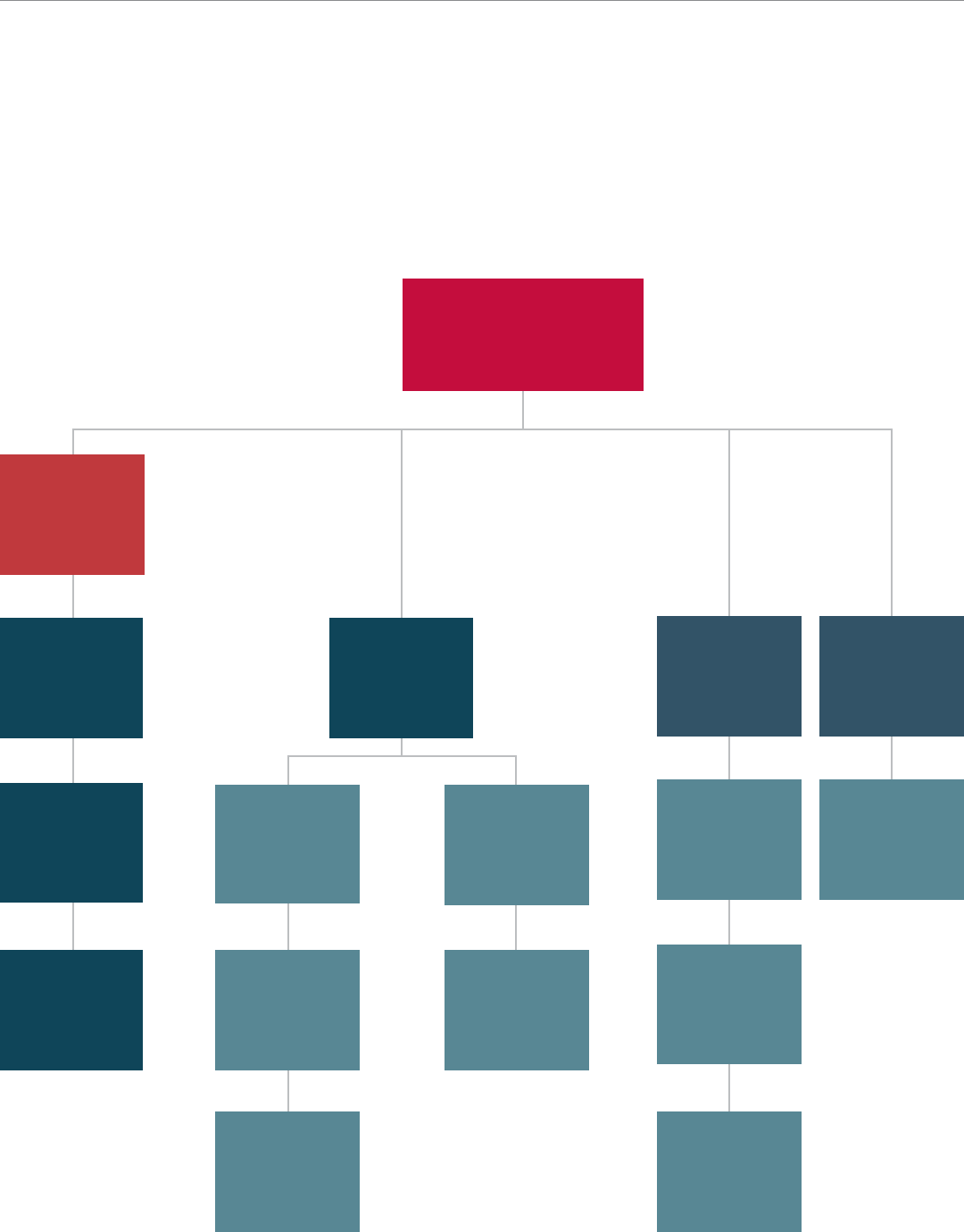
Page 8 of 84
Financial Regulation Annual Report 2023
MANAGEMENT
Director of
Licensing
Arlene Williams
Director of
Money Services &
Consumer Credit
Supervision
Sabrina Brown
Director of
Administration
Michelle Denoncourt
Director of
Mortgage
Supervision
Christine Brooks
Assistant
Commissioner -
Corporate Activities
Stephen Clampett
Assistant
Commissioner -
Financial Services
Licensing &
Supervision
Shereefat Balogun
Assistant
Commissioner -
Depository
Supervision
Teresa Louro
Deputy
Commissioner of
Financial Regulation
Vacant
Director of
Trend Analysis &
Reporting
Brendan Armbruster
Director of
Outreach &
Education
Meredith Merchant
Director of
Consumer Services
Priscilla Wynn
Assistant
Commissioner -
Consumer Services,
Outreach & Trend
Analysis
Sean McEvoy
Director of
Legislative
Response &
Acting Student
Loan Ombudsman
Amy Hennen
Assistant
Commissioner -
Policy
Vacant
Director of
Operations
Cliff Charland
Director of
Enforcement
Dana Allen
Commissioner of
Financial Regulation
Antonio “Tony” Salazar
ORGANIZATIONAL CHART

Page 9 of 84
Financial Regulation Annual Report 2023
ACCREDITATION, INNOVATION AND REGUL ATORY
Accreditation
The Office has been accredited by the Conference of State Bank
Supervisors (CSBS) for its regulation of state-chartered banks since
July 13, 1992. State bank regulatory agencies must undergo a re-
accreditation examination and audit every five years and submit annual
assessment updates to retain certification. The CSBS Accreditation
Program is designed to encourage the standardization of state-
chartered bank supervision, identify weaknesses, and capitalize on
the strengths of state banking agencies. The process assists OFR in
effectively carrying out its responsibilities in supervising Maryland-
chartered financial institutions, of ensuring that institutions operate
in a safe and sound manner, legal and regulatory compliance, and
providing responsive services.
The Office has been accredited for its mortgage supervision by
CSBS and the American Association of Residential Mortgage
Regulators (AARMR) through their joint accreditation program since
August 31, 2016. Mortgage accreditation serves the same purpose
as banking accreditation but it applies to the supervision of non-
depository mortgage brokers, lenders, and servicers, and it requires,
among other things, that OFR’s policies and procedures in licensing,
examination, enforcement, and consumer complaint response
meet high standards and follow best practices.
The Office received its initial money services businesses accreditation
from CSBS and the Money Transmitter Regulators Association on
June 28, 2022. Maryland is the seventh state financial regulatory
agency (out of all the U.S. states and territories) to apply for money
services businesses accreditation. The money services businesses
program is responsible for supervising the activities of financial service
providers that offer check cashing or money transmission services to
Maryland residents. The Office conducts examinations and investigates
complaints from Maryland consumers about these businesses.
Fintech Innovation Contact
Significant changes continue to occur in the
financial services sector. The Office is committed
to fostering a regulatory environment that supports
a robust, accessible, and equitable financial
system that features responsible innovation and
fair competition. The Office’s designated Innovation
Contact continued to support innovation efforts
in the financial services sector and to facilitate
communication between OFR, entrepreneurs,
and financial technology (“fintech”) companies.
The Innovation Contact is the Office’s point of
contact for entrepreneurs, fintech officials, and
new fintech companies who need assistance in
navigating the licensing process, reviewing
business concepts, evaluating risk management
and compliance management systems,
and providing feedback on business plans.
Additionally, the Innovation Contact is available
to provide information about doing business
in Maryland and to answer questions about
Maryland’s financial laws, rules, and regulations
as they might affect financial products in fields
such as money transmission, virtual currencies,
payments, or lending.
Assistant Commissioner Shereefat Balogun
assumed the role of Innovation Contact in
FY 2023 following the departure of Deputy
Commissioner Greg Thoreson. Throughout FY
2023, the Innovation Contact regularly received
and, with the assistance of the newly formed
High-Quality Standards, Evolving Financial Technologies and Coordinated Supervision
HARMONIZATION

Page 10 of 84
Financial Regulation Annual Report 2023
Innovation and Emerging Issues Committee, responded to inquiries
regarding how Maryland’s financial regulatory system impacted
current and prospective fintech companies operating or seeking to
operate within the State.
Having been informally created in FY 2022 and established under
a formal charter in FY 2023, OFR’s Innovation and Emerging Issues
Committee is an internal cross-functional committee composed of
OFR managers that exists to: (1) support the Innovation Contact as
they seek to foster responsible innovation in the financial services
sector; (2) facilitate communication between OFR staff and entities
offering financial services, (3) ensure the regulatory and supervisory
mandates of OFR are addressed on an intra-agency basis, and (4)
facilitate intra-agency and inter-agency communication regarding
emerging issues.
Networked Supervision
The Office maintains its active participation in multistate
coordination efforts with CSBS and sister state financial regulators
to foster innovation and the achievement of a modern, efficient
regulatory system. These multistate coordination efforts, referred to
as “networked supervision”, provide a more streamlined experience
for industry and regulators through the recognition of standards
and the coordination of activities across state lines.
The Office remains engaged in a multi-year effort to leverage
technology solutions and harmonize laws across states in order to
more effectively supervise financial service providers through a
networked approach with other financial regulators. These efforts
will enable regulated financial service providers to more fully engage
in national-scale activities while protecting consumers and the
financial system in each state. Examples of OFR’s participation
include the following:
• Leading negotiations, along with two other states, as part of a
multistate enforcement action against a payment processing
company for negligent customer data management practices
in processing mortgage payments.
• Continuing participation in the development and deployment of
next-generation technology platforms to streamline licensing,
supervision, and enforcement.
• Participation in the pilot program “One Company One Exam”
for mortgage examinations.
• Continuing participation in multistate mortgage and money
service business examinations.
• Participating as a Phase 1 state under the Multistate Money
Services Businesses Licensing Agreement, responsible for
reviewing elements of money transmitter licensing applications
common to all states.
• Coordinating with other state regulators to harmonize licensing
and supervisory practices.
Office personnel continue to serve in key
roles impacting networked supervision. In
FY 2023, the Director of Operations for the
Financial Services Licensing and Supervision
Unit served as the President and as a member
of the Board of Directors of AARMR and was
recently re-elected to serve another term.
The Office’s Director of Mortgage Supervision
is currently serving on the AARMR/CSBS
Multistate Mortgage Committee which oversees
large multistate mortgage supervision, and the
Office’s Director of Money Service Business
and Consumer Credit Supervision serves on the
Education Steering Committee of the Money
Transmitter Regulatory Association which
establishes national standards for examiner
education. The Office also participates in the
ongoing efforts to modernize the Nationwide
Multistate Licensing System and the State
Examination System.
The Office continues to actively support
multistate efforts to establish new standards
and laws designed to harmonize, where
appropriate, the practices of state financial
regulators. In FY 2023, OFR proposed changes
to Maryland’s Money Transmission regulations.
The proposed changes, which are intended to
implement the Uniform Money Transmission
Modernization Act (“Uniform Act”) model
law, will further harmonize Maryland law with
that of other states and foster uniformity and
coordination in states’ regulation of money
transmitters. The proposed changes received
a number of comments during the notice and
comment period. In response to the comments
received, OFR issued a statement addressing
the significant and relevant issues raised in the
public comments. The Office also modified
the proposed rule to provide greater clarity on
certain issues and address some substantive
concerns. The modified proposal is expected to
be finalized and a final rule issued in FY 2024.
The Office, through Commissioner Salazar,
is taking a lead role in the national efforts to
encourage and assist states in adopting the
Uniform Act.

Financial Regulation Annual Report 2023 Page 11 of 84
Annual message from the
Commissioner, fiscal year
highlights, promoting equity
and access, monetary
recoveries and penalties,
and legislative and
regulatory summaries.
ACHIEVEMENTS &
PRIORITIES

Page 12 of 84
Financial Regulation Annual Report 2023
MESSAGE FROM THE
Antonio P. “Tony” Salazar has been
the Maryland Commissioner of
Financial Regulation since July 5, 2017.
I have the honor of presenting this
Fiscal Year’s (FY) Annual Report to
Governor Moore under the Office’s new
name: “Office of Financial Regulation’’.
After 113 years of being known as
“The Office of the Commissioner of
Financial Regulation’’, the Office’s new
name became effective on July 1, 2023.
Though the Office’s name has changed,
its mission of serving as Maryland’s
consumer financial protection agency
has not.
During FY 2023, OFR continued to
uphold its tradition of strong consumer
protection while also engaging in
effective and impactful regulatory and
supervisory activities, strengthening
its capabilities, and securing significant
legislative results. In that regard, and as
discussed below, the Office broached
the topics of climate change and
equitable access to financial services,
it gave public notice of its enforcement
priorities, and it continued to seek and
implement innovative ways to carry out
its mission. These are topics and trends
that will be continued in FY 2024 and
beyond.
Last year the Office laid out six goals
for FY 2023. The goals revolved around
the following topics and I am happy to
report that the Office made significant
advances in each of these areas:
1. Continuing the Office’s tradition of
strong consumer protection actions.
2. Engaging in effective and impactful
regulatory and supervisory activities.
3. Enhancing community and
industry engagement and
education.
4. Enhancing investment in staff.
5. Understanding data availability,
needs and usage.
6. Collaborating with sister state
regulators.
Many of the Office’s activities
advanced one or more of its goals. For
example, OFR continued pursuit of
several ongoing enforcement actions
and commenced new investigations
and cases. Some of the existing
cases involve complex legal issues
surrounding the rules to be followed
by non-banking companies who
partner with out-of-state banks to lend
in our state at rates that would not
be permitted by Maryland law. The
Office initiated 52 new investigations
involving violations of Maryland
consumer financial laws and issued
an Order to shutter the operations
of an entity operating a non-licensed
financial institution. The Office’s
licensing, supervisory and consumer
service units each identified and took
steps to remedy illegal, unlicensed,
and other harmful activities resulting
in changes in the business practices
and consumer restitution. Of note
was the Office’s leadership role in
concluding a multistate settlement
agreement with ACI Worldwide,
Inc. where OFR and other state and
federal regulators responded to the
company’s transmission of more
than 1.4 million erroneous mortgage
payment debit instructions affecting
over 478,000 consumers nationwide
and approximately 14,000 consumers
in Maryland. These and other actions
detailed below illustrate the Office’s
continued commitment to strong
consumer protection and impactful
regulatory activities.
During FY 2023, the Office issued a
revised set of enforcement priorities
to improve the allocation of its
investigative and legal resources. In
particular, the list of enforcement
priorities is intended to identify the
types of behaviors and practices OFR
determines to be the most abusive
and harmful to Maryland consumers
and the financial services industry.
The priorities are described below
and topically cover: new or innovative
products or services, bank-fintech
partnerships, recidivism, systemic
issues resulting in widespread
consumer harm, and redlining and
discrimination in lending.
Legislation pursued and supported
by OFR during the Maryland
Legislature’s 2023 session was
consequential as it ranged from
bills that changed the Office’s
name and, notably, the manner in
which it collects revenue from non-
depository entities, to important
advances for consumers in the
realms of equity and mortgage
lending.
COMMISSIONER

Page 13 of 84
Financial Regulation Annual Report 2023
Working with the Administration, the Office helped ensure the
passage of Governor Moore’s groundbreaking Access to Banking
Act (House Bill 548). The Act represents an innovative approach to
the objective of ensuring that all Marylanders and their respective
communities have access to financial services. The Act seeks to
improve communities’ access to physical branches of depository
institutions by providing depository institutions with incentives to
open and maintain their branches in low-to-moderate income (LMI)
communities, while also authorizing the Commissioner to utilize funds
from the Depository Special Fund to seed a public/private venture
fund that will have a mission of seeking financial technology products
and companies that can be instrumental in increasing lending to small
businesses in such communities.
The Office obtained passage of a bill that helps it meet its goal of
operating a modern regulatory system. The new law puts Maryland
at the forefront of the movement to improve the licensing of non-
depository entities by eliminating the concept of “branch” licenses,
and the paperwork, costs, and other administrative efforts that are
associated with issuing such licenses. It replaced the current licensing
and fee structure with a modern structure, one that involves the
issuance of one license per entity (instead of licensing each branch
location) and permits OFR to issue annual assessments in order to
fund its operations. The law created a reinstatement process allowing
licensees to renew their expired licenses rather than reapplying, and
it clarified requirements pertaining to the use of trade names. The
changes will guarantee the funding of OFR’s future non-depository
activities and are anticipated to reduce the burdens on regulated
industries while also streamlining the Office’s administrative
workflow.
With the passage of House Bill 1150, which was sought by OFR,
the Legislature modified Maryland’s mortgage lending laws to
clearly provide that shared appreciation arrangements are to be
governed by Maryland’s mortgage laws. While OFR believed that
such products were covered by the State’s mortgage laws, it sought
the clarification to avoid litigation and in response to products that
market participants argued were not covered by such laws. The
new law is intended to protect consumers from the risks inherent in
these complex transactions and OFR anticipates that the new law
will protect and benefit consumers by establishing a clear licensing
and regulatory framework for oversight of transactions that are
sometimes structured to avoid disclosure and other consumer
protection requirements.
The Office was also active on the regulatory front as it publicly
pursued two new regulations and commenced work on two others.
The publicly issued regulations dealt with foreclosure procedures
and, importantly, changes to the money transmitter regulations that
are designed to complete Maryland’s adoption of the Conference
of State Bank Supervisors’ (CSBS) Model Money Transmission
Act. In FY 2024, the Office intends to issue regulations on shared
appreciation mortgages and on the Office’s use and sharing of other
states’ mortgage examinations.
I, and other members of OFR, remained active in leadership
positions in multistate regulatory organizations. These positions
enhance our Office’s capabilities, enable OFR staff participation
in the development of national standards and policy and, overall,
strengthen our Office’s ability to protect consumers and reach our
goals. For example, I have been active in the Conference of State
Bank Supervisors, serving as the Vice Chair of the Non-Depository
Supervisory Committee. At the CSBS 2023 annual meeting, I was
elected to serve as the group’s Vice Chair. As
a member of the Federal Deposit Insurance
Corporation’s (FDIC) Advisory Committee of
State Regulators, I directly provided advice
and information to the Chairman and Board
of the FDIC. I also assumed a post as a
representative of the National Association of
State Credit Union Supervisors (NASCUS) to
the FBIIC (Financial and Banking Infrastructure
Information Committee). It is a post that keeps
me, and through me the Office, connected with
technology and cyber issues at the highest
levels of government. Other OFR staff, including
Directors Charland, Allen, Brooks, and Brown,
regularly participate in interstate discussions
and also serve as officers of multistate
organizations. Student Loan Ombudsman
McEvoy announced his departure from OFR in
FY 2023 and would be replaced by Director
of Legislation Amy Hennen who assumed the
role as acting Student Loan Ombudsman. As
Student Loan Ombudsman she engaged in
significant outreach and discussions with other
state and federal student loan organizations,
agencies and ombuds offices. All in all, OFR
staff increases the Office’s effectiveness when
they participate in and coordinate with other
state and federal agencies and organizations.
The State Collection Agency Licensing Board
again operated with full membership as it
gained two new members in Ms. Traci Rezvani
who joined the Board in the role of a consumer
representative and Mr. Shawn Kennedy who
joined the Board in the role of an industry
representative.
The Office took a number of steps to meet
our engagement goal including, continuing to
meet with consumer advocates in large and
small group settings, holding over 40 outreach
events, issuing 15 advisories on various topics,
and adding the foreclosure information that we
make available on our website to the State’s
Open Data Portal. The Office continued to
be supportive of and worked closely with
the Maryland Department of Housing and
Community Development on its Homeowner
Assistance Fund, and ongoing foreclosure
prevention initiatives. The Office held its third
annual “Regulatory Highlights” webinar, a
live-streamed event for regulated industries
and interested consumer groups, during which
OFR staff and leadership provided legislative,
supervisory, and enforcement updates. As
noted above and in her separate report,
Ombudsman McEvoy and Acting Student
Loan Ombudsman Hennen also undertook
a number of meetings and actions, including
providing consumers with the opportunity
for video meetings and engaging with the
Maryland Center for Collegiate Financial

Page 14 of 84
Financial Regulation Annual Report 2023
Wellness to inform borrowers of changes to federal payment and
waiver programs. In sum, those actions and the others detailed in this
report are all part of OFR’s commitment to stay connected to and
engaged with the public and key constituents. Finally, I continued
to be a member of the Maryland Financial Education and Capability
Commission.
The Office’s Licensing Unit again processed over 20,000 license
applications during the fiscal year. That accomplishment was made
possible by the hard work and dedication of the Licensing Unit staff.
Mortgage lenders/servicers, money service business, and consumer
credit companies that are licensed by the Office are subject to
periodic examinations to ensure that they are sound and operating
according to law. Those examinations are carried out by OFR’s
examiners from the Mortgage Supervision and Money Services
and Consumer Credit Supervision Units. Members of these staffs
distinguished themselves not only by the volume of their work,
having completed over 200 examinations of licensed entities, but
also by the quality of their work as leaders and/or participated in
multiple multi-state examinations, and some examiners lent their
expertise to the state system by providing training and or
IT knowledge.
The Office’s Consumer Services Unit continued to resolve
consumer complaints and finalized the implementation of the new
State Examination System (SES). The SES, which is also used by
the financial services supervisory unit to conduct examinations, is an
integral piece of state financial regulators’ networked supervisory
strategy. While it saw a 19% increase in complaint volume, OFR’s
Consumer Services staff was able to successfully recover $125,425
for Maryland consumers.
The States’ banks and credit unions performed well during the
fiscal year despite the headwinds caused by the continuing
increase in interest rates and the liquidity scare that arose in the
early Spring of 2023. As in recent past years, the vast majority
of Maryland’s state-chartered institutions were controlling risks,
were well managed, capable of withstanding business fluctuations,
and operating in substantial compliance with applicable laws and
regulations. However, as explained in the Depository Supervision
section of this report, that conclusion was not one that would’ve
been anticipated in the Spring of 2023 when the confidence in the
nation’s banking system suffered a serious blow upon the sudden
failure of two large, regional banks from California and New York.
Those failures caused significant distress to the country’s banking
system and OFR and other state and federal regulators worked
diligently during that period to continuously monitor institutions’ and
market conditions, implement new programs to enhance institutions’
liquidity, and review the circumstances that lead to the failures
to guide future policy. Fortunately, Maryland and its consumers,
businesses and financial institutions avoided serious repercussions
from the failures. Maryland’s financial institutions continued providing
uninterrupted financial services to their customers and by and large
they experienced satisfactory financial results, ending the fiscal year
in a fundamentally sound condition. Overall, it was a stressful time.
I would like to commend OFR’s depository staff for their hard work
during long days and thank the Maryland Bankers Association,the
MD|DC Credit Union Association, and their receptive members for
their cooperation and the coordination they provided to OFR and
other regulators.
Internally, OFR worked diligently to fill vacancies and to provide its
staff with the modern technology they need to ensure that the Office
operates efficiently and effectively and remains
a leader among state regulators. The Office
increased the amount of its budget allocated to
employee training and development and saw
employees take advantage of the opportunities
that were offered.
Looking to FY 2024, the Office again undertook
a structured strategic planning process that saw
it following Governor Moore’s directive to be a
State agency that supports the goal of “leaving
no Marylander behind.” To that end, and
working with Labor Secretary Wu, the Office
adopted FY 2024 goals that are as follows:
1. Protect Maryland consumers from financial
harm and educate them to make informed
financial decisions.
2. Modernize Maryland’s financial regulatory
system to adapt to rapid change and to be
efficient and effective for all stakeholders
through the use of technology and data.
3. Promote an equitable and inclusive financial
system that leaves no Marylander behind
and fosters broader participation by low to
moderate income communities and small
businesses in the financial system and state
economy.
4. Enhance employee engagement and
empower employees to execute with
excellence.
5. Strengthen the Office’s collaboration with
sister state regulators and other Maryland
agencies, to create a system that is
networked, transparent, and excellent.
In closing, I am honored to have had the
privilege of serving as Maryland’s Commissioner
of Financial Regulation for the past six years.
I am thankful to Governor Moore and Labor
Secretary Wu for giving me the opportunity
to continue serving in that capacity and look
forward to working with them, Maryland’s
legislators, OFR’s staff, and its stakeholders as
we all strive to protect Maryland’s consumers
and generally improve its consumer financial
services sector.
Antonio P. “Tony” Salazar
Commissioner of Financial Regulation,
State of Maryland
Annual Report
Fiscal Year Ended
June 30, 2023

Page 15 of 84
Financial Regulation Annual Report 2023
FISCAL YEAR 2023
Consumer Recoveries and Penalties Assessed: The Office collected a total of $358,539 in combined monetary
recoveries for Maryland consumers and civil penalties against companies and/or individuals that were identified to have
violated various State laws and/or regulations.
Equity and Access: The Office collaborated with Governor Moore to gain passage of the Access to Banking Act, a
new law that seeks to encourage financial institutions to retain and grow access to banking services in low-to-moderate
income communities.
Legislation: Three bills initiated by the Office in the 2023 General Assembly session became law.
Regulation: The Office finalized changes to the regulations for Foreclosure Procedures for Residential Property. The new
regulations provide clarity regarding the Commissioner’s authority to address violations of law or regulation, the rights of
homeowners, and the responsibilities of mortgage services.
Depository Institutions: Maryland-chartered banks’ total assets increased by 5.38% to $49.7 billion and Maryland-
chartered credit unions’ total assets increased by 2.5% to $8 billion.
Licensing: The Office licensed or registered 20,313 individuals and businesses, and collected $40,300 in penalties due to
prior unlicensed activity.
Financial Services Supervision: The Office completed 184 examinations of mortgage and money transmission business.
Mortgage Supervision assessed $208,375 in monetary recoveries for Maryland consumers from violations identified
during mortgage examinations.
Consumer Services: The Office was successful in recovering restitution payments of $125,425 for Maryland consumers
through the investigation and resolution of consumer complaints.
Enforcement: The Office assessed $27,840 in monetary recoveries for Maryland consumers and collected $40,162 in
penalties from a credit service business for unlawful practices associated with mortgage loan modification consulting
services.
Outreach and Education: The Office’s Outreach Unit organized or participated in 42 events, conferences, and stakeholder
meetings.
Data and Reporting: The Office implemented a process for monthly postings of foreclosure data on the Maryland Open
Data Portal.
Student Loan Ombudsman: The Ombudsman began offering video chat appointments for student loan borrowers and
presented to four different stakeholder groups.
HIGHLIGHTS

Page 16 of 84
Financial Regulation Annual Report 2023
EQUITY AND ACCESS TO
As part of the Office’s consumer protection and regulatory
mandate, OFR seeks to promote principles and practices that
are designed to ensure that Maryland’s financial services sector
operates equitably and that all Marylanders have access to safe
and well-regulated financial services.
Use of Data
In FY 2023, the Office started to utilize data and statistics in new
ways to better understand the demographics of banking, lending
and foreclosure in Maryland and to identify patterns indicating
potential disparities or inequities. For example, mortgage and
foreclosure data may reveal redlining, reverse redlining, or other
discriminatory or disparate lending practices.
Sources of data include the FDIC’s Unbanked and Underbanked
Survey, Federal Financial Institutions Examination Council (FFIEC)
branch location data, Home Mortgage Disclosure Act lending
data, Mortgage Bankers Association mortgage lending and
default data (obtained through the Conference of State Bank
Supervisors), and call reports from supervised
companies. The Office also analyzes consumer
complaint data from its own Consumer Services
Unit, as well as from federal agencies, including
the Consumer Financial Protection Bureau,
Federal Trade Commission, and Office of Federal
Student Aid in the U.S. Department of Education.
Additionally, OFR conducts routine analyses of
address-level data from the Maryland Foreclosure
Registration System, with a focus on geographic
and demographic data obtained from the U.S.
Census Bureau and the Maryland Department of
Information Technology.
The Office’s analyses are primarily used for
decision-making, strategic planning, policy
development, and for various supervisory
activities, such as examinations and investigations.
The Office shares statewide foreclosure data
FINANCIAL SERVICES

Page 17 of 84
Financial Regulation Annual Report 2023
publicly on the Foreclosure Data Tracker page of OFR’s
website and data aggregated by county and zip code is
shared on the Maryland Open Data Portal. In FY 2024,
OFR will explore if additional aggregated data or reports
can be made available to a wider audience in an effort
to improve transparency and better inform the public
and interested stakeholders, including policymakers and
researchers.
Planning and Policy
The Office’s FY 2024 strategic plan, developed in the
last quarter of FY 2023, included several objectives
and tactics focused around issues of equity and access.
As an example, one of OFR’s goals in the next fiscal
year is to “promote an equitable and inclusive financial
system that leaves no Marylander behind and fosters
broader participation by low-to-moderate income (LMI)
communities and small businesses in the financial
system and state economy.”
The 2021 FDIC National Survey of Unbanked and
Underbanked Households shows the importance of
policies that promote equitable access to safe and
affordable deposit accounts at insured institutions.
• Approximately 5.9 million or 4.5% of U.S. households
identified as “unbanked”, meaning that no one in the
household had a checking or savings account at a
bank or credit union. In Maryland, 5% of households
were unbanked.
• Differences in unbanked rates between Black and
White households and between Hispanic and White
households were present at every income level. In
Maryland, 10.6% of Black households were unbanked
as opposed to 1.8% of White households.
• The most cited reason from survey respondents for
why they do not have a bank account was “Don’t
have enough money to meet minimum balance
requirements”.
The Office is exploring strategies to improve accessibility
of banking services in Maryland’s LMI communities and
expanding outreach efforts, particularly to vulnerable
populations who often face systemic discrimination
or may not have the opportunity to access financial
education resources.
Additionally, enforcement priorities were revised in FY
2023 to explicitly state that ensuring equal access to
lending opportunities, particularly mortgage lending, for
everyone regardless of race or national origin is a focus
for the Office. This includes investigations of complaints
alleging violations of the Equal Credit Opportunity Act,
Fair Housing Act, and other anti-discrimination laws.
Enforcement priorities are described in greater detail in
the Enforcement section of this report.
In the FY 2023 General Assembly Session, OFR assisted
with passage of Governor Moore’s Access to Banking
Act. The Act promotes the growth of financial services in
LMI communities through the use of assessment credits
to Maryland state-chartered banks and credit unions
that operate branches in LMI communities; and through
the establishment of a venture fund to invest in financial
innovations that develop opportunities for banking
institutions and credit unions to better serve the needs of
LMI communities. More information about this Act is in the
Message from the Commissioner, Legislative Summary,
and Depository Supervision sections of this report.

Page 18 of 84
Financial Regulation Annual Report 2023
MONETARY RECOVERIES FOR CONSUMERS AND
Consumer Recoveries
Total Consumer Recoveries FY 2023
$174,663
Monetary recoveries for consumers result from
OFR’s commitment to protect the public from
economic harm caused by companies or individuals
providing financial services in Maryland. During FY
2023, the Office recovered and provided $174,663 in
restitution to consumers across all Units.
Total Consumer Recoveries Fiscal Year 2023
$174,663
Penalties Assessed
Total Penalties Assessed FY 2023
$183,876
During FY 2023, OFR investigated or examined
companies and/or individuals that were identified
to have violated various State laws and/or
regulations, and as a result of those investigations
and examinations, collected assessed penalties of
$183,876.
Total Penalties Assessed Fiscal Year 2023
$183,876
TOTAL
$358,539
PENALTIES ASSESSED

Financial Regulation Annual Report 2023 Page 19 of 84
License No. License Type No. of Penalties Instances of Restitution
1 Sales Finance 3
2 Consumer Loan 1 2
3 Installment Loan
4 Collection Agency 11 4
6 Mortgage Lender 74 23
8 Credit Reporting Agency 1
9 Check Casher
10 Bank 3
11 Credit Union 16
12 Money Transmitter 12
14 Debt Management Service Provider
15 Debt Settlement Service Provider
19 Licensed Check Casher
26 Mortgage Originators
28 Credit Services Business 1 1
29 Check Casher Registration
34 Registered Exempt Collection Agency
36 Exempt Mortgage Lender - Registered
N/A Other 2 28
TOTAL 89 93
MONETARY RECOVERIES
Below is a breakout of the number of penalties assessed and instances of restitution by type of license during FY 2023.

Page 20 of 84
Financial Regulation Annual Report 2023
LEGISLATIVE AND REGULATORY
Legislative Summary
The Maryland 2023 General Assembly
adjourned on April 10th, concluding a
successful legislative session. The Office
proposed three bills, worked closely
with the Governor’s Office on another
bill, and provided technical support on
other legislation focused on improving
the Office’s efficiency, clarifying
Maryland laws under its jurisdiction,
enhancing consumer protections, and
promoting a safe and healthy financial
services industry. Those bills and other
notable legislation that passed during
the 2023 session of the Maryland
legislature are described below.
HB 379/SB 929: Commissioner of
Financial Regulation - Name and
Organization of Office
Effective date: July 1, 2023
This law, initiated by the Commissioner,
changes the name of the Office under
the Commissioner of Financial Regulation
in the Maryland Department of Labor
to the “Office of Financial Regulation’’.
The law also establishes a new Deputy
Commissioner position that is for financial
services licensing and supervision (aka,
non-depository activities).
HB 686: Financial Regulation -
Modernizing Licensing of Non-
Depository Institutions and Elimination
of Branch License Requirements
Effective date: July 1, 2023
This law, initiated by the Commissioner,
eliminates the requirements for collection
agencies and certain non-depository
financial institutions to maintain separate
licenses for their branch locations. It
authorizes them to conduct business at
multiple licensed locations under a single
license. Financial service businesses will
pay one licensing fee that will include
all branches plus an assessment the
amount of which is determined by the
Commissioner each year. The assessment
will be based on actual costs to regulate
the business, including risk and size. All
licensed locations will be covered under
a business’s bonding requirements to
ensure consumer protection. The Office
intends to draft and issue appropriate
implementing regulations.
HB 1150: Commercial Law and
Financial Institutions - Credit Regulation
- Shared Appreciation Agreements
Effective date: July 1, 2023
This law, initiated by the Commissioner,
makes certain that shared appreciation
agreements are subject to the Maryland
Mortgage Lender Law and other
provisions of law that regulate certain
loans of single extensions of closed end
credit and revolving credit plans. The
Office will adopt regulations regarding
the enforcement of and compliance with
provisions of law that regulate shared
appreciation agreements.
HB 548/SB 550: Financial Regulation -
Maryland Community Investment
Venture Fund - Establishment
(Access to Banking Act)
Effective date: July 1, 2023
This law, initiated by the Governor,
establishes the Maryland Community
Investment Venture Fund. The Fund is
to be established by the Commissioner
with seed money from the Depository
Special Fund. Under the new law,
Maryland-chartered banks and credit
unions with branches in LMI census
tracts will be able to apply for credits
toward the annual assessment amount.
The law encourages banks and credit
unions to deposit the value of the credit
into the venture fund and permits the
Commissioner to match some or all
these funds. The Venture Fund will
be used to provide seed funding to
small businesses developing new
access to capital for under-resourced
small businesses located in LMI
communities.
SB 516: Cannabis Reform
Effective date: upon enactment
This law establishes a regulatory and
licensing system for adult-use cannabis
and requires the Administration,
by July 1 2023, to convert medical
cannabis licenses to licenses to
operate a medical and adult-use
cannabis business. The Office will
monitor the banking sector for any
issues with banks and credit unions
that chose to provide banking services
to licensed cannabis businesses.
HB 384: Income Tax - Student Loan
Debt Relief Tax Credit - Alterations
Effective date: July 1, 2023
This law increases the total amount of
credits against the State income tax
that the Maryland Higher Education
Commission may approve in a
taxable year for student loan debts.
Additionally, it extends from two years
to three years, the period of time that
an individual who claims the credit
has to prove that they used the credit
to repay the individual’s student loan
debt. The Student Loan Ombudsman
within OFR will monitor and advise
Marylanders on this issue.
HB 680: Institutions of Higher
Education - Transcripts - Prohibition
on Punitive Measures Related to
Student Debt
Effective date: July 1, 2023
This law prohibits an institution of
higher education from refusing to
provide a current or former student
with a transcript or taking other
punitive measures regarding a
student’s transcript request because
the student owes a debt to the
institution of higher education. The
Student Loan Ombudsman within
OFR will monitor this issue.
Changing Legal Environment and Innovative Regulatory Advancements
SUMMARY
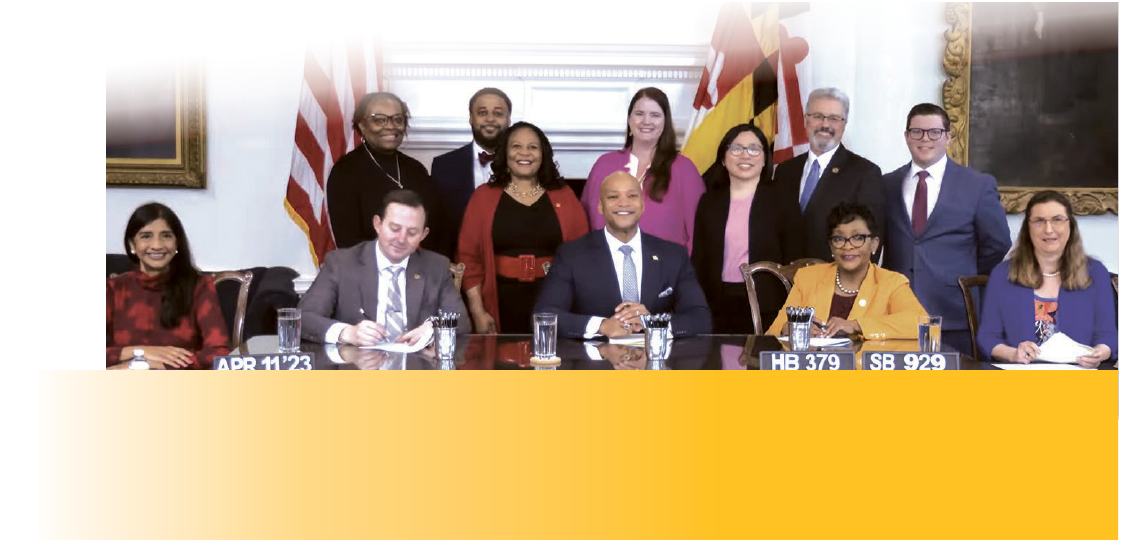
Financial Regulation Annual Report 2023 Page 21 of 84
LEGISLATIVE & REGULATORY
ADVANCEMENTS
HB 913: Financial Institutions - Student Financing
Companies - Required Registration and Reporting
Effective date: October 1, 2023
This law requires student financing companies to register
with the Commissioner of Financial Regulation before
providing services in the State; requires a student
financing company to renew its registration on an annual
basis; authorizes the Commissioner to adopt registration
procedures for student financing companies, which
may include certain fees; and requires student financing
companies to annually report certain information, to be
made publicly accessible on a certain website, to the
Commissioner beginning March 15, 2024. The Office
will create a registry with NMLS for student financing
companies to register and a portal for these companies to
provide the required information. The Office will post this
information on its website and report it in the Student Loan
Ombudsman Annual Report.
SB 106: Courts - Judgments - Exemptions
From Execution
Effective date: October 1, 2023
This law exempts up to $500 in a deposit account or
other account of a judgment debtor held by a depository
institution from execution on the judgment without an
election by the debtor to exempt the money. Further, it
establishes procedures a depository institution is required
to follow on receipt of a writ of garnishment or other levy
or attachment under certain circumstances. The Office will
monitor licensees who may be impacted by this legislation.
HB 127: District Court - Small Claims - Enforcement
of Money Judgments
Effective date: October 1, 2023
This law prohibits the District Court, in aid of enforcement
or execution of a money judgment resulting from a certain
small claim action, from ordering the appearance of an
individual for an examination or ordering an individual to
answer interrogatories. The Office will monitor licensees
who may be impacted by this legislation.
Regulatory Summary
The Office successfully pursued two noteworthy regulatory
initiatives during the fiscal year:
Foreclosure Procedures for Residential Property
Effective date: March 1, 2023
On December 16, 2022, the Commissioner adopted
amendments to Regulations in COMAR 09.03.12
Foreclosure Procedures for Residential Property. The
changes to the regulation were made final in 49:26 Md.
R. 1078-1079 (December 16, 2023). The amendments
were issued in order to harmonize certain regulations
that are inconsistent or contradictory as a result of recent
changes within the Maryland Annotated Code, update and
generally improve existing requirements and forms within
the mediation process, and update provisions regarding
the Commissioner’s authority to address violations of
law or regulation. The changes are intended to reduce
procedural gaps within the foreclosure mediation process
and to provide greater clarity regarding the rights and
responsibilities of mortgage servicers and consumers.
Money Transmission
Effective date: FY 2024
On February 24, 2023, the Commissioner proposed
amendments to Regulations in COMAR 09.03.14 Money
Transmitters. The proposed changes implement provisions
of the CSBS Model Money Transmission Modernization Act
and are intended to further harmonize Maryland law with
other states and provide clarity and certainty regarding
the responsibilities of money transmitters and the rights of
consumers. The changes are anticipated to be effective in
FY 2024.
Commissioner Salazar and Director of Legislative Response at the bill signing
for HB379/SB 929; with Maryland’s Senate President, Governor Moore,
Secretary Wu, and Speaker of the House of Delegates.
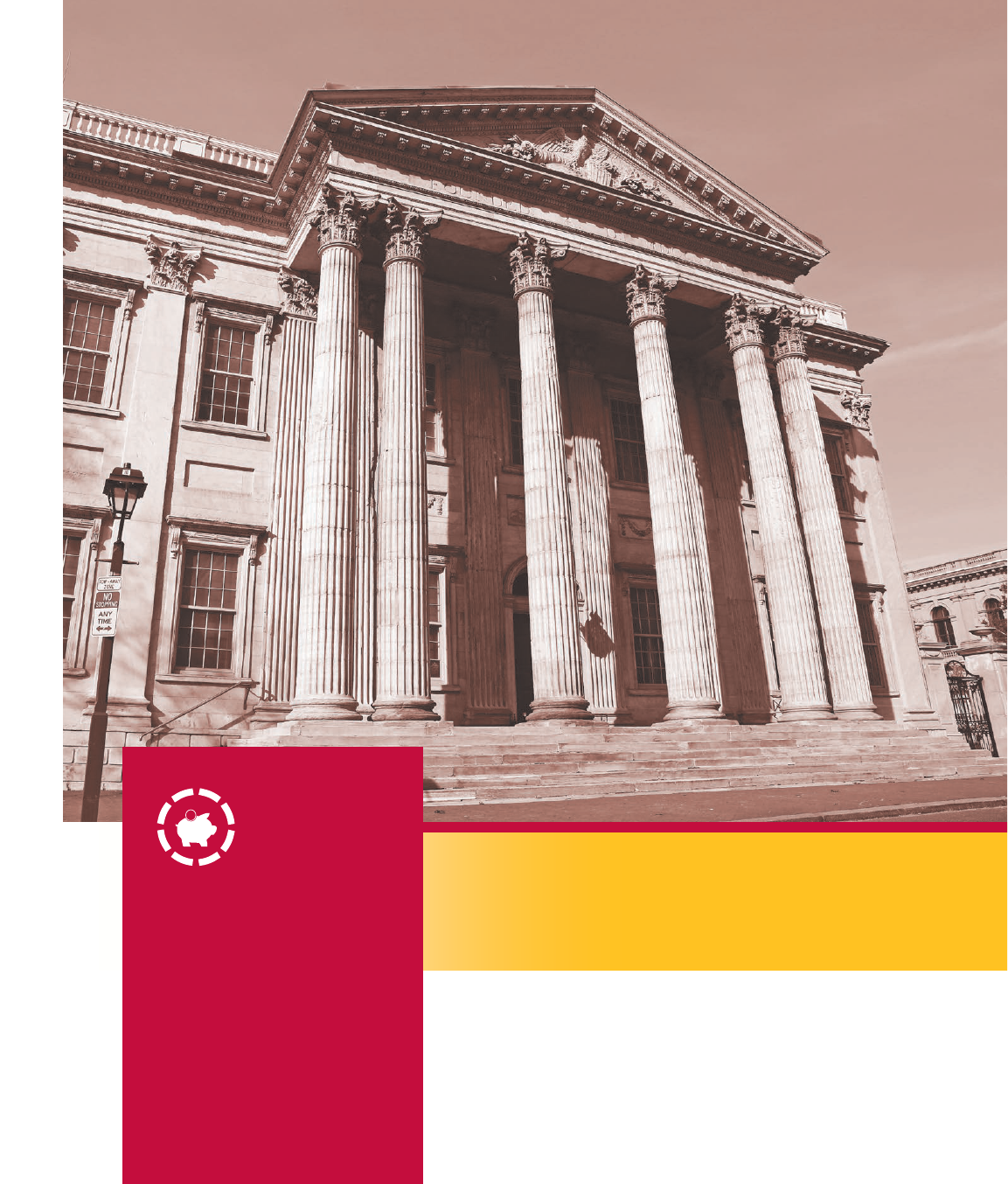
$
Financial Regulation Annual Report 2023 Page 22 of 84
Updates on the
Office’s regulatory
and consumer-focused
activities over
the past fiscal year.
INDUSTRY SUPERVISION &
CONSUMER PROTECTION

Page 23 of 84
Financial Regulation Annual Report 2023
DEPOSITORY
The Office’s Depository Unit regulates and supervises a total of
33 Maryland state-chartered institutions as of the end of FY 2023.
Of those institutions, 22 are banks, seven are credit unions, and
four are non-depository trust companies. The Depository Unit also
supervised the American Share Insurance Corporation (ASI), an
Ohio-based, private provider of deposit insurance for credit unions.
The Depository Unit is overseen by the Assistant Commissioner for
Depository Supervision and as of the end of FY 2023, the Unit had
14 bank examiners on staff, of which five are examiners-in-charge.
Overall, Maryland-chartered financial institutions performed well in
FY 2023. Maryland’s banks and credit unions reported solid financial
condition, sound asset quality, ample capital augmentation, and
sufficient liquidity in the face of challenging market conditions.
In the Spring of 2023, liquidity became a focus for all regulatory
agencies because of two large regional bank failures in California
and New York. In response to the upheaval in the banking sector
precipitated by the failures, OFR risk-assessed its chartered
institutions and began focusing specifically on institutions’ immediate
liquidity sources, uninsured deposits exposure, non-bank financial
institution deposits concentrations, and investment portfolios. The
Office implemented daily liquidity monitoring of high-risk institutions,
as well as daily meetings with management of the institutions, and
it maintained regular contact with federal bank regulators. The
Federal Reserve created the Bank Term Funding Program (BTFP)
which offered loans of up to one year in length to banks and credit
unions pledging collateral eligible for purchase by the Federal
Reserve Banks in open market operations such as U.S. Treasuries,
U.S. agency securities, and U.S. agency mortgage-backed securities.
The BTFP served as an additional source of immediate liquidity
at reasonable terms. The Office contacted all Maryland-chartered
institutions and strongly encouraged them to establish a funding line
with the Federal Reserve discount window so they could have an
alternative funding source should the need arise. While Maryland’s
financial institutions did not face the liquidity pressures that affected
many of the nation’s financial institutions in the Spring, the majority
of the State’s banks and some credit unions took advantage of the
program and established BTFP funding lines, and some even used
their new funding line due to the attractive rates that were offered.
Overall, Maryland-chartered banks and credit unions strengthened
their liquidity positions and enhanced internal monitoring of liquidity
following the turmoil of Spring 2023.
Facing moderate loan demand throughout FY
2023, Maryland-chartered institutions were
fortunate to enjoy excess liquidity which was
primarily reallocated to securities investment
portfolios that generated higher returns given
the increasing rate environment. FY 2023 saw
Maryland state-chartered banks and credit
unions adopting the “current expected credit
losses” (CECL) methodology for estimating
their allowances for credit losses. The adoption
of CECL led to higher provision expenses
despite asset quality generally remaining good.
In April 2023, OFR gave a “Climate Change
Risks and Maryland Financial Institutions”
presentation to the management teams and
Boards of Directors of the State’s banks and
credit unions. The purpose of the presentation
was to provide guidance about OFR’s current
expectations regarding the management of the
various risks posed by climate change and on
the establishment of governance structures to
manage those risks. The Office’s climate change
presentation was well attended and banks
and credit unions were provided with learning
and discussion points regarding the effects
of climate change risk on Maryland financial
institutions. The Office continues to participate
in the CSBS District I Task Force, led by the
New York Department of Finance, on climate
change risk to community banks.
The Office continued its practice of issuing
regulatory advisories and guidance, responding
to inquiries from bankers, and monitoring loan
activity, concentrations, liquidity, information
technology and cybersecurity oversight, and
compliance with the Bank Secrecy Act/Anti-
Money Laundering.
Supervising Maryland State-Chartered Banks, Credit Unions, and Trust Companies
SUPERVISION

Page 24 of 84
Financial Regulation Annual Report 2023
DEPOSITORY
Bank Supervision
In FY 2023, only one Maryland-chartered bank was acquired by an
out-of-state bank. The reduction in the number of banks supervised
by OFR, from FY 2022 to FY 2023, is a considerable improvement
from the loss of five banks over FY 2021 to FY 2022. Management at
many Maryland-chartered banks remained focused on reevaluating
their resources, maintaining sound asset quality, and enhancing
earning performance during challenging economic times. Despite the
loss of one bank, total assets held by the remaining 22 banks under
OFR’s supervision grew by $2.5 billion, or 5.38%, from $47.1 billion to
$49.7 billion in FY 2023.
Aggregate capital in Maryland-chartered banks increased
approximately 6.10% from $5.1 billion to $5.4 billion over FY 2023.
The capital increased despite a slight decline in earnings caused
by an increase in provisions for loan and lease losses and reduced
noninterest income. Bank holding companies continued to be
successful in raising capital during FY 2023 and downstreamed equity
into their bank subsidiaries. The combined reported capital leverage
ratio of 10.77% represented a modest increase and can be generally
attributed to capital accretion outpacing asset growth. All Maryland-
chartered banks ended FY 2023 well-capitalized.
Even with the loss of one bank, Maryland-chartered banks’ aggregate
level of net loans and leases increased by 8.40%, from $33.8 billion
to $36.7 billion. Their level of investment securities also increased by
$403 million, or 5.38%, to $7.9 billion in FY 2023. Maryland-chartered
banks continued to serve their commercial customers with the Small
Business Administration’s Paycheck Protection Program (PPP) loans,
loan forgiveness, and loan modifications.
Asset quality performance indices for
Maryland-chartered banks were again positive
in FY 2023. With most institutions experiencing
loan growth, the level of non-performing assets
to total assets increased from the multi-year
low of 0.37% reported at FYE 2022 to a
higher level of 0.59% in FY 2023. That level
represents a continued historically low level
of non-performing assets, and of the non-
performing assets, other real estate owned
assets decreased significantly by 35.29% to
$11.0 million over the same period as banks
were able to liquidate the properties they
held in the face of the increasing interest rate
environment. Net charge-offs to total loans
and leases increased but ended the fiscal
year at a manageable, and also extremely low
level, of 0.12%, representing an increase over
the historically low 0.02% reported at FYE
2022. The overall level of banks’ allowance for
loan and lease losses increased by 24.46%, to
$450.8 million, which is commensurate with the
growth in loan portfolios and the adoption of
the CECL allowance calculation methodology.
Based upon these asset quality performance
indices, Maryland-chartered banks entered FY
2024 poised to focus on asset growth and net
operating income.
Supervising Maryland State-Chartered Banks, Credit Unions, and Trust Companies
SUPERVISION

Page 25 of 84
Financial Regulation Annual Report 2023
Toward the end of FY 2022, the Federal
Reserve’s Federal Open Market Committee
(FOMC) began raising interest rates in an effort
to curtail inflation. Maryland’s banks retained
good liquidity and they took advantage of the
higher interest rates by growing their investment
portfolios. The increased rates enabled Maryland
banks to generate increased interest income
on their loan portfolios and invested funds. The
FOMC continued its increasing interest rate
strategy throughout FY 2023 and into FY 2024.
For the State’s banks, earnings performance
experienced a continuing negative trend during
FY 2023. The banks’ average return on assets
(ROA) decreased from 1.49% ending FY 2022
to 1.35% at the end of FY 2023. As described
above, much of the decrease is attributed to
increased provisions for loan and lease losses
over FY 2022, which outweighed the increase
in the banks’ collective net interest margin.
Specifically, Maryland-chartered banks’ net
interest income was bolstered by the increasing
interest rate environment which improved their
collective net interest margin to 3.66% at the end
of FY 2023, from 3.53% at the end of FY 2022.
Safety and soundness examinations continued
to be full scope although examination activities
were modified in FY 2023 to accommodate
remotely conducted examinations and to
reduce the burden on Maryland bankers. During
examinations and off-site monitoring, OFR
assessed banks’ capital levels, asset quality
performance indices and trends, management
oversight, earnings levels and trends, liquidity
and funds management, sensitivity to interest
rate risk, and risk management practices, with
an emphasis on liquidity levels, liquidity risk
management, liquidity concentrations, uninsured
deposits and fundings sources, commercial
real estate lending, and lending concentrations.
Information technology, cybersecurity, and the
Bank Secrecy Act/Anti-Money Laundering
reviews and assessments also continued as
essential components of examinations.
Worthy of note is the fact that OFR issued
only one formal enforcement action due to
Bank Secrecy Act concerns during FY 2023.
To the extent that OFR had other concerns
with a small number of specific institutions, it
addressed them through enhanced regulatory
supervision and oversight, employing a variety
of means including regular teleconference calls,
visitations and targeted examinations, meetings
with management and Boards of Directors, off-
site reviews and monitoring, and informal enforcement actions.
As a result of their organic growth, Maryland has two state-chartered
banks each with over $10 billion in total assets and another four banks
each with assets over $1 billion. Banks over $10 billion in total assets
are required to comply with a variety of federal regulations that are
applicable to large, complex banking organizations. In addition, those
banks are subject to the examination and supervision authority of the
Consumer Financial Protection Bureau which examines institutions for
compliance with federal consumer financial laws.
Topics in the forefront of OFR’s work to continue into FY 2024 include
closely monitoring banks’ liquidity positions, asset quality, and servicing
practices related to information technology oversight, financial elder
abuse monitoring and prevention, and succession planning for both
management and Boards of Directors. Interest rate risk and liquidity risk
management will also continue to receive thorough attention throughout
FY 2024 as will compliance with the CECL reserve methodology and
the Bank Secrecy Act. Cannabis-related banking, which involves banking
related to marijuana and hemp products, gained attention in FY 2023,
and it is expected to remain a topic of interest as adult use marijuana
became legal in Maryland on July 1, 2023. The Office anticipates more
state-chartered banks will begin servicing cannabis-related businesses
in FY 2024.
Maryland-chartered banks have always had a significant impact on
the regional economy and they proved their significance during the
COVID-19 pandemic. The banking industry in Maryland continues to
serve its customers more efficiently; improve products, services, and
processes; and grow assets, and in some cases have partnered with
fintech companies to help in those efforts. Recognizing, however, that
there are gaps in the delivery and accessibility of banking services in
the State, and consistent with Governor Moore’s goal of establishing
Maryland as a state that leaves no one behind, in FY 2023 OFR began
planning implementation of the Access to Banking Act (House Bill 548)
in order to support and encourage industry efforts to ensure that banking
services and credit are offered equitably to all communities in the State.
The Office will remain in active dialogue with bank management teams
throughout the state and regularly seek out and participate in outreach
events sponsored by the Maryland Bankers Association, the Federal
Deposit Insurance Corporation, and Federal Reserve Bank. And, OFR
has and will continue to issue regulatory guidance when necessary, as
well as address institution-specific situations when they arise as part of
its mission to protect Marylanders through the operation of a modern
financial regulatory system that promotes respect for consumers,
safety and compliance, fair competition, responsible business
innovation, and a strong state economy.
Credit Union Supervision
The Office regulates and supervises seven Maryland-chartered credit
unions. Of the seven credit unions, the deposits of six are federally
insured through the National Credit Union Share Insurance Fund with
the deposits of the remaining credit union being privately insured by
ASI. Each of the credit unions received full scope safety and soundness
examinations during FY 2023. Those examinations were frequently
conducted via a hybrid approach with some work conducted remotely
and some work conducted onsite at the institution. As with the

Page 26 of 84
Financial Regulation Annual Report 2023
bank examinations, some examination activities were modified to
accommodate remote examination activity and to reduce the burden
on credit union management and staff. The Office supplemented
the examinations with quarterly, off-site monitoring and targeted
examinations as deemed necessary.
Overall, in FY 2023, the level of total assets held by Maryland-chartered
credit unions increased by 2.5% from $7.8 billion ending FY 2022 to
$8.0 billion ending FY 2023. Over the same period, total loan receivables
increased to $5.6 billion from $5.3 billion, investment and securities
declined from $1.7 billion to $1.4 billion, shares and deposits decreased
negligibly to $6.7 billion from $6.8 billion, and total capital increased
to $811.8 million from $757.5 million. Throughout FY 2023, Maryland-
chartered credit unions continued to serve their business members
with PPP loans, loan forgiveness, and loan modifications. Additionally,
the credit unions’ net worth increased from 9.70% of total assets to
10.21% of total assets, as capital accretion outpaced asset growth,
while their combined ROA increased considerably from 0.33% to 0.75%.
Much of the increase in their ROA was driven by the higher interest
rate environment that considerably improved their interest income.
Much as with the bank supervisory program, the focus of OFR’s work
in FY 2024 insofar as credit union supervision is concerned is to continue
close monitoring of credit unions’ liquidity, asset quality, cybersecurity
oversight, financial elder abuse monitoring and prevention, and
succession planning for management, directors, and Supervisory
Committee members. Interest rate risk, the CECL reserve methodology,
the Bank Secrecy Act/Anti-Money Laundering, and cannabis-related
banking, which includes banking related to marijuana and hemp
products, will also continue to receive attention throughout the 2024
fiscal year. Finally, OFR will be conducting follow-up on its 2023
climate change presentation and engaging with the state’s credit
unions to ensure they benefit from the Access to Banking Act
(House Bill 548) and that they participate in efforts to ensure that
financial services are offered equitably to all communities in the State.
Like Maryland’s banks, Maryland state-chartered credit unions also
benefited from a strong economy despite the Federal Reserve Bank
increasing interest rates, primarily in FY 2023 and continuing into FY
2024, in an effort to curtail inflation. Credit unions continued to serve
their membership and focused on increasing
membership and generating profitable assets.
The Office continues to be committed to
assisting credit union management with leading
their institutions while meeting the needs of
their membership. The Office has and will
continue to issue regulatory guidance when
necessary, and the Commissioner and staff
will remain in active dialogue with credit union
management and their Boards of Directors.
Also, OFR will continue to seek out and
participate in outreach events sponsored by
the MD|DC Credit Union Association and the
National Credit Union Administration (NCUA).
Non-Depository Trust Company
Supervision
Maryland’s four state-chartered non-depository
trust companies continued to perform effectively
throughout FY 2023. Trust company management
worked diligently to meet the needs of their
clients during uncertain domestic and global
times. Managed and non-managed assets
experienced strong growth with total assets-
under-management increasing to $596.2 billion
ending FY 2023 from $530.6 billion ending FY
2022. Trust companies generated net income
of $75.1 million during the first half of calendar
year 2023, which is up moderately from $73.9
million in net income generated during the first
half of calendar year 2022.
The trust companies anticipate additional growth
in FY 2024 and management will continue to
monitor volatility and economic conditions
in national and international bond and equity
markets, interest rates, and real estate markets.
Safety and soundness examinations of non-
depository trust companies are full scope
and have been conducted remotely since the
pandemic. The Office expects to conduct hybrid
examinations during FY 2024. Examiners’ focus
will remain on asset management, earnings,
capital, management, operations, internal
controls and audit, compliance, Bank Secrecy
Act/Anti-Money Laundering compliance,
information technology/cybersecurity
oversight, and succession planning.
Commissioner Salazaar and Secretary Wu at Financial Regulation
meeting April 2023.

Financial Regulation Annual Report 2023 Page 27 of 84

Page 28 of 84
Financial Regulation Annual Report 2023
DEPOSITORY
The Office began FY 2023 with regulatory responsibility for 23
banks with $47.142 billion in total assets, and ended FY 2023 with
responsibility for 22 banks with $49.677 billion in total assets, resulting
in an annual asset growth rate of 5.38%. While asset growth remained
steady over the past five years, the number of Maryland-chartered
banks has continued its decline. The 22 Maryland-chartered banks in
FY 2023 represent a 37.14% decrease from the 35 Maryland state-
chartered banks in FY 2018. The decrease from 23 to 22 Maryland-
chartered banks was due to the merger of a Maryland-chartered
bank into a bank chartered in West Virginia. Additionally, in FY 2023
OFR approved the merger of a Maryland-chartered bank into a
national bank headquartered in Maryland, however this merger did
not become effective until July 1, 2023. The completion of this merger
at the start of FY 2024 further reduces the number of Maryland-
chartered banks to 21.
While the number of Maryland-chartered banks continues to decrease,
the percentage of total bank assets held nationally as compared to
total bank assets held by Maryland-chartered banks continues to
increase, and bank consolidation has not adversely impacted the
asset growth for Maryland-chartered banks. Despite asset growth
remaining steady, OFR continues to monitor the possible effects that
consolidation and the resulting reduction in the number of Maryland-
chartered banks may have on local industry practices and control.
The Office also maintains regulatory responsibility for the seven
Maryland-chartered credit unions. Combined assets of these
seven institutions totaled $7.952 billion on June 30, 2023, which
represented annual asset growth of 1.78% for FY 2023. While total
asset growth slowed in FY 2023 for Maryland-chartered credit
unions, total asset growth over the past five years for Maryland-
chartered credit unions is 34.84%.
The consolidation and relocation of branches by Maryland-chartered
banks and credit unions remained robust in FY 2023. This trend
is a result of industry consolidation and a response to consumers
increasingly favoring the usage of electronic services to traditional
brick-and-mortar branch services. In FY 2023, a Maryland-chartered
credit union opened a new branch in Baltimore, Maryland, a Maryland-
chartered bank opened a new location in Cambridge, Maryland, and
(as of the date of this report) another Maryland-chartered bank will
be opening a new branch in Ocean City, Maryland, approved by
OFR in FY 2023.
As of the end of FY 2023, the State of
Maryland is served by 77 banks with 1,214
bank branches, down by 41 branches from
the previous year. While the number of bank
branches continues to decrease, JP Morgan
Chase Bank, a large national bank, notably
expanded from 26 to 32 branches in Maryland
in FY 2023. Out-of-state banks continue to
apply to open or relocate branches and offer
financial services in Maryland. Several branch
applications submitted by an out-of-state
bank and approved by OFR in FY 2023 are
scheduled to open in FY 2024.
Furthermore, as of the end of FY 2023, there
are forty branches operated by Maryland-
chartered banks in LMI neighborhoods in
Maryland and there are fourteen branches
operated by Maryland-chartered credit
unions in LMI neighborhoods. Of particular
note, on January 10, 2023, SECU, Maryland’s
largest credit union, earned the Low-Income
Designation (LID) from the NCUA. To qualify
as an LID credit union, a majority of SECU’s
membership met certain low-income thresholds.
The LID status comes with certain benefits
for SECU and its membership. These benefits
include an exception from the statutory cap
on member business lending, which may
expand access to capital for small businesses,
eligibility for grants and low-interest loans from
the Community Development Loan Fund, the
ability to accept non-member deposits, and the
authority to obtain supplemental capital. With
the addition of SECU’s LID status in 2023, five
of seven Maryland state-chartered credit unions
now possess a Low-Income Designation.
The Office maintains partnerships with
Maryland counterparts at the Office of the
Comptroller and the State Department of
Assessments and Taxation to improve the
Asset Growth and Consolidation Among Maryland State-Chartered Institutions Persist
CORPORATE ACTIVITIES

Page 29 of 84
Financial Regulation Annual Report 2023
experience of financial institutions doing business in Maryland.
Successful coordination with these agencies ensures that applications
are processed timely and records are accurate.
The number of merger applications also remained steady in FY 2023
as the industry continues to consolidate. OFR does not anticipate this
trend subsiding. As noted above, OFR approved two applications in
FY 2023 that resulted in the merger of a Maryland-chartered bank
into another institution. Provident State Bank, a Maryland-chartered
bank headquartered in Preston, Maryland, was acquired by Summit
Community Bank, a West Virginia-chartered bank headquartered in
Moorefield, WV. Additionally, Community Bank of the Chesapeake,
a Maryland-chartered bank headquartered in Waldorf, Maryland, was
acquired by Shore United Bank, a national bank headquartered in
Easton, Maryland. The merger of Community Bank of the Chesapeake
into Shore United Bank did not become effective until July 1, 2023.
The Office also approved the acquisition of Partners Bancorp, a
Maryland incorporated bank holding company for both The Bank of
Delmarva, a Delaware-chartered bank, and Virginia Partners Bank,
a Virginia-chartered bank, by LINKBANCORP, Inc., the Pennsylvania
incorporated bank holding company for LINKBANK, a Pennsylvania-
chartered bank. The merger did not impact the number of Maryland-
chartered banks, however both The Bank of Delmarva and Virginia
Partners Bank maintain branches in Maryland. And, while the merger
is still awaiting final federal regulatory approvals,
it is further illustration of the strong trend toward
consolidation within the industry.
Throughout FY 2023, OFR continued to intake,
review, and process applications from Maryland
state-chartered and out-of-state institutions
needing OFR’s approval to effectuate certain
changes to these institutions’ corporate
operations. Among these submissions, OFR
processed fourteen representation as a bank
or trust company applications from out-of-state
institutions; four applications to amend the
bylaws of a Maryland-chartered institution; two
Maryland Affordable Housing Trust applications,
and one application submitted by a Maryland-
chartered bank (BayVanguard Bank) to convert
from a savings bank to a commercial bank.
For additional facts and figures, see Appendix
A: State-Chartered and Depository Institutions
on page 50.

Page 30 of 84
Financial Regulation Annual Report 2023
The Licensing Unit is responsible for the licensing and registration of financial service providers under OFR’s jurisdiction.
This includes the processing of original, renewal, and relicensing of applications. The license categories under OFR’s
jurisdiction include mortgage lenders, brokers, and servicers; money transmitters; check cashers; debt management
service providers; debt settlement service providers; collection agencies; consumer lenders; installment lenders; sales
finance companies; credit service businesses; and consumer credit reporting agencies. The Unit also licenses individuals
as mortgage loan originators.
By the end of FY 2023, the Unit issued and managed 20,313
2
licenses to individuals and businesses, representing a
decline of 18% from the previous year. A large portion of the decline was due to the economic environment in which
rising interest rates saw the mortgage industry experiencing a slowdown late in FY 2022 continuing into FY 2023.
As a result, the Unit saw a significant reduction in the number of licensed mortgage lenders and loan originators. The
tightening interest rates did not significantly impact the licensure of other industry participants as there was a significant
increase in the non-mortgage space. In particular, sales finance companies in Maryland increased from 843 in FY 2022
licensed entities to 1,060 in FY 2023.
When reviewing new license applications, the Unit ascertains whether the applicant may have improperly engaged
in licensable activities prior to the application. During FY 2023, the Unit collected $40,300 in penalties due to prior
unlicensed activity.
Streamlining the Licensing Process
The Unit furthered its efforts to streamline licensing processes in FY 2023. During its 2023 session, Maryland’s General
Assembly passed, and Governor Wes Moore signed, House Bill 686. The new law, which takes effect in FY 2024, makes
significant changes to the Maryland statutes governing the licensure of financial service providers. Starting July 1, 2023
OFR will cease issuing, maintaining, and renewing individual licenses for branch locations, and there will be no license fee
associated with those locations. This change will apply to all business types licensed by OFR or by the State Collection
Agency Licensing Board. Each business will need only a single Maryland license for a given business activity as that
license will serve for all locations properly disclosed to OFR at which the licensee conducts business.
In addition to the elimination of branch licensing, the new law allows OFR to levy a variable, annual assessment
proportionate to each business. When determining the amount of an assessment, OFR may utilize a number of factors,
including a licensee’s volume of business conducted in Maryland and the risks posed by its operations. The new law does
not impact other requirements for licensure, such as bond requirements and the disclosure of all branch locations and
trade names.
2
This number refers to licenses in active status.
Opening Doors for Business
LICENSING

Page 31 of 84
Financial Regulation Annual Report 2023
License Category
New Licensees
FY 2023
Total Licensees
FY 2023
New Licensees
FY 2022
Total Licensees
FY 2022
Check Casher 33 246 64 247
Collection Agency 136 1,561 107 1,547
Consumer Loan 31 234 25 223
Credit Service Business 19 70 22 62
Debt Management 3 25 0 16
Installment Loan 13 186 22 182
Money Transmitter 62 274 53 278
Mortgage Lender 832 3257 917 3,531
Mortgage Loan Originator 2,721 13,294 6,359 17,801
Registered Exempt Mortgage Lender 3 17 2 7
Sales Finance 223 1060 148 843
TOTAL 4,076 20,224 7,719 24,737
New Business Licensees and Total Business Licensees, by Category
Fiscal Years 2023 and 2022
Registrant Category
New Registrants
FY 2023
Total Registrants
FY 2023
New Registrants
FY 2022
Total Registrants
FY 2022
Credit Reporting Agencies 7 55 10 75
Debt Settlement Services 9 38 5 48
TOTAL 16 93 15 123
New Business Registrants and Total Business Registrants, by Category
Fiscal Years 2023 and 2022
The Unit continued its participation in the Multistate Money Services Businesses Licensing Agreement (MMLA) which
was established to create a more efficient money service business licensing process among state regulators. The MMLA
allows applicants to apply for licensure in multiple states without submitting multiple applications. Rather, one lead state
reviews the core application requirements and the other (non-lead) states will rely on the lead state’s review during
their own approval process. The other states only need to review their own state-specific requirements, if any. Utilizing
the MMLA helps make the licensing process more consistent and efficient for all parties. The Office’s Licensing Unit
processed three multistate applications as the lead state in FY 2023.

Page 32 of 84
Financial Regulation Annual Report 2023
FINANCIAL SERVICES
The Financial Services Licensing and
Supervision Unit changed its name in FY 2023
from “Non-Depository Supervision” to better
reflect the activities of the Unit and the types
of institutions it supervises. The Unit supervises
the individuals and businesses that are licensed
or registered to provide credit and other
financial services to Maryland consumers. These
financial service providers include mortgage
lenders, brokers, servicers, and originators,
money transmitters, debt management services
providers, debt settlement services providers,
collection agencies, credit reporting agencies,
check cashers, consumer lenders, sales
finance companies, credit service businesses,
and installment loan companies. In FY 2023,
the Unit had regulatory oversight of more
than 15,700 individuals and more than 3,800
businesses.
The Unit maintains a regular examination
program for mortgage service providers,
money transmitters, and debt management
service providers. During examinations, Unit
staff members (“financial examiners”) assess
the operations of these licensees to ensure
that they are complying with applicable
laws and regulations and operating in a
safe and sound manner, minimizing risks to
Maryland consumers. Violations identified by
examiners may result in restitution to Maryland
consumers or in civil penalties. In FY 2023,
the Unit assessed approximately $86,500 in
penalties relating to violations identified during
examinations.
As part of the Office’s efforts to work
cooperatively with fellow regulators in other
states, share information, and leverage
each other’s resources, the Unit continued
to conduct examinations through the State
Examination System (SES) during FY 2023. The
SES is a comprehensive system for examination
and regulatory investigation management that:
simplifies communication between regulators
and licensees during examinations or investigations, allows for customized
information requests from regulators to licensees, provides for secure
transmission of electronic documents from licensees to regulators,
allows for storage of examination and investigative records, and aids in
the sharing of examinations and regulatory investigations among states.
During FY 2023, the Unit’s Assistant Director of Mortgage Supervision
served on a working group which developed a proposal to streamline
the conduct of examinations through SES by eliminating duplicative or
extraneous “information requests” sent through the system to businesses
being examined.
The Unit continued to provide representation on various national boards
and committees during FY 2023. The Unit is represented on the Multistate
Mortgage Committee, the Board of Directors of the American Association
of Residential Mortgage Regulators, the Education Steering Committee
of the Money Transmitter Regulators Association, and the NMLS Money
Services Business Call Report Subcommittee.
Mortgage Supervision
Mortgage Supervision supervises the business activities of licensed
mortgage brokers, lenders, servicers, and loan originators conducting
business in Maryland. Companies that maintain a Maryland Mortgage
Lender License are licensed to conduct mortgage brokering, lending, and
servicing activities with respect to Maryland residential mortgage loans.
Individuals that maintain a Maryland Mortgage Loan Originator License
are employees of a mortgage lender licensee and are licensed to take
mortgage loan applications from Maryland residents and negotiate loan
terms.
Mortgage Supervision is responsible for conducting examinations of
licensed mortgage brokers, lenders, servicers, and loan originators.
Through its examinations, Mortgage Supervision ensures that licensees
comply with applicable federal and state laws and regulations in providing
financial services to Maryland residents.
A statutory enactment during FY 2021 changed the examination
scheduling requirement for each licensee under the responsibility of
Mortgage Supervision from once during any 36-month period to once
during any 60-month period. Maryland law retained the requirement
that new licensees be examined within 18 months of initial licensure. This
change was made to provide Unit staff with greater flexibility to conduct
risk-based examinations. A risk-based approach allows OFR to examine
well-managed, compliant businesses less frequently than those deemed
risky, so the examination staff can place greater emphasis and resources
on businesses that pose a heightened risk to Maryland consumers.
Supervising Mortgage, Consumer Credit, and Money Services Businesses
SUPERVISION

Page 33 of 84
Financial Regulation Annual Report 2023
In FY 2023, Mortgage Supervision commenced examinations
of 253 licensed businesses and completed examinations of 138
licensed entities (some of the completed examinations having
commenced prior to the start of the fiscal year). Mortgage
Supervision assessed $208,375 in monetary recoveries
for consumers from violations identified during mortgage
examinations.
Mortgage Supervision staff continues to take an active role
in multistate examinations of mortgage lenders, brokers,
and servicers. These multistate examinations benefit both
consumers and industry – states benefit as the use of a large,
multistate team of examiners results in a more robust, more
detailed examination than a single state could perform on its
own. Businesses also benefit in their ability to manage one
comprehensive examination, rather than a series of individual
state examinations, thereby reducing regulatory burden. In FY
2023, the Unit participated in four joint examinations with other
states under the auspices of AARMR/CSBS Multistate Mortgage
Committee (MMC). As of the end of FY 2023, two of these
examinations are still in progress.
Employees of the Unit continue to maintain their professional
competence through continuing education. During FY 2023,
Mortgage Supervision staff members attended training on
subjects including corporate governance and cybersecurity risks.
Staff members were also trained on a new baseline cybersecurity
examination program. Mortgage Supervision’s more tenured
examiners continue to maintain Certified Mortgage Examiner
or Certified Senior Mortgage Examiner certifications issued
by CSBS. In addition, three examiners hold the Certified Fraud
Examiner designation and attended training sponsored by the
Association of Certified Fraud Examiners.
In FY 2023, Mortgage Supervision continued to
have an employee appointee on the MMC, and
had an employee re-elected to another term as
an officer and member of the Board of Directors
of AARMR. This representation, along with the
continued participation in MMC examinations,
ensures that Mortgage Supervision staff have an
active role within the state regulatory community
and provides meaningful input into coordinated
mortgage supervision nationwide.
Money Services and Consumer
Credit Supervision
Money transmitters, also known as remittance
companies, are financial organizations that specialize
in providing fast and reliable cross-border money
transfer services. They offer a range of services,
such as receiving and transmitting funds, issuing
money orders and travelers’ checks, and providing
prepaid stored value cards. In addition, many
money transmitters offer innovative technologies
such as mobile apps and online platforms to
enhance consumer access to financial services.
Looking ahead, the Office plans to sustain its
emphasis on oversight of money transmitters.
This will involve ongoing collaboration with
industry stakeholders, regulatory bodies, and
other parties to ensure that the industry remains
secure, transparent, and compliant with established
regulations. During FY 2023, the money

Page 34 of 84
Financial Regulation Annual Report 2023
transmission industry continued to witness a swift pace of technological
innovation, coupled with an increase in the number of new business
models that involved the transfer of virtual currencies. Some of
these technological innovations include mobile money services,
neobanks, and payment gateways. Recognizing the evolving risks
that come with innovation in this space, particularly to Maryland
consumers and the Maryland financial services industry, the Office
continues to strengthen its oversight of money transmitters. For
example, in FY 2023, the Office chartered the Innovation and
Emerging Issues Committee. The main responsibility of this
committee is to support innovation in the financial services sector
under the jurisdiction of the Commissioner and ensure the
regulatory and supervisory mandates of OFR are addressed
on an intra-agency basis.
Money transmitters fall under the classification of money service
businesses as per federal law. As such, they are required to comply
with the regulations governing Anti-Money Laundering and the Bank
Secrecy Act. To ensure consistency with these regulations, Money
Services and Consumer Credit Supervision (MSCCS) examiners
participate in programs with the U.S. Internal Revenue Service and
the U.S. Treasury Department’s Financial Crimes Enforcement
Network. The primary objective of these programs is to prevent
money laundering and promote financial transparency.
During FY 2023, the MSCCS Unit conducted examinations of
61 licensed entities. Out of those, 22 were full examinations, while
39 were desk reviews. In desk reviews, staff members review
examination reports from other states’ regulators and supplement
that information with a review for compliance with Maryland laws
and regulations. This risk-based approach to examinations allows the
Office to examine licensees in an efficient and timely manner while
still maintaining minimum standards and the Office’s commitment to
protecting consumers. The 61 entities that underwent examination
offer services through a total of 734 authorized delegates located
throughout the State.
During FY 2023, the MSCCS Unit participated in 22 multistate
examinations, with 16 of these examinations being conducted under
the “One Company, One Exam” program. This initiative streamlines
the examination process for large money transmitters that operate in
at least 40 states. Under this program, these entities are subjected to
only one examination per year, which is conducted jointly by multiple
state regulators. States that do not participate in the examination
process are required to either accept the report of the joint examination
or abstain from examining the company for at least 12 months. This
approach aims to reduce the regulatory burden on the company and
promote a cooperative network approach to regulation by the states.
The employees working in the MSCCS Unit
ensure that they keep themselves updated with
the latest industry developments and receive
regular training to maintain their professional
development. Last fall, the examiners attended
the Money Transmitter Regulators Association’s
(MTRA) Intermediate and Advanced Examiner
Schools, and the MSCCS staff also attended
other relevant training sessions. MCCCS’s
senior examiners hold the Certified Money
Service Examiners certification issued by
CSBS. Furthermore, with the advancements
in cryptocurrency, in FY 2023 the MSCCS
Unit continued to deepen its expertise in this
evolving area. For example, the Unit received
training on the fundamentals of cryptocurrency,
including attending a “Crypto Risk and
Regulations” course offered by CSBS and
obtaining the “Cryptocurrency Fundamentals
Certification” offered by Chainalysis. Staff
also attended the Cybersecurity Audit School
offered by CSBS to enhance their skills and
knowledge in IT and cybersecurity.
In FY 2023, the MSCCS Unit had staff
representing OFR on two key committees:
the Education Steering Committee of the
MTRA, which is responsible for establishing
national standards for examiner education;
and the Money Service Business Call Report
Sub Committee, a State Regulatory Registry
Committee, which sets the standards for
money service business financial reporting
to the National Multistate Licensing System
(NMLS). In addition, MSCCS staff participated
in the pilot program for the State Examination
System Training for MSB Examiners to provide
feedback on the functionality of the multistate
system. The participation of MSCCS staff
on these committees and the pilot program
highlights OFR’s and the Unit’s support of and
commitment to a strong and coordinated state
regulatory system. It also demonstrates the
Unit’s dedication to learning and development
by staying abreast of national standards and
best practices in the field of financial regulation
and examination.

Page 35 of 84
Financial Regulation Annual Report 2023
CONSUMER
The Consumer Services Unit (CSU) investigates complaints from
Maryland consumers about financial service providers that are
licensed, registered, or chartered in Maryland or that are engaged in
financial service activities regulated by OFR. Consumer complaints
play a vital role in helping OFR enforce consumer protection laws and
monitor trends in the financial services industry. In FY 2023, CSU
received 1,317 complaints, a 19% increase over the prior fiscal year.
Complaint investigations are typically resolved within 60 days.
In FY 2023, the average amount of time for complaint resolution
ranged from 31 to 58 days (as calculated monthly). When determining
an appropriate resolution to a complaint, CSU considers issues
of harm or potential harm to the general public as well as specific
to the individual complainant. If the investigation reveals that
violations of law have occurred, further action may be taken by
OFR, including requiring the reimbursement of fees, interest,
or other consumer restitution. In FY 2023, CSU was successful
in recovering restitution payments of $125,425 for Maryland
consumers through its investigative and complaint resolution
activity. Over the last five fiscal years, CSU has recovered a
total of $846,573 for Maryland consumers.
The Unit assists consumers with a range of complaint issues involving the financial service industries and activities regulated
by OFR, and responds to consumer inquiries over the phone and via email. The Unit also supports the Maryland Student
Loan Ombudsman with student loan complaint intake and resolution. Consistent with trends from prior fiscal years, the
largest proportion of consumer complaints received by CSU involved issues related to mortgages and foreclosures,
representing approximately 21% of all complaints in FY 2023.
From FY 2022 to FY 2023, there was a 47% increase in complaints involving Maryland banks and credit unions, and a 62%
increase in non-jurisdictional complaints. The subjects of “non-jurisdictional complaints’’ are national banks and federal
credit unions (which are supervised by a federal agency) or out-of-state banks and credit unions (which are supervised by
the financial regulator in the state where the institution is chartered). The significant share of non-jurisdictional complaints
in FY 2022 was attributed to changes in OFR’s electronic consumer complaint form. The increasing share of consumer
complaints in FY 2023 that are categorized as non-jurisdictional could be a result of national or state economic trends, such
as the growing number of banks and credit unions operating in Maryland that are not chartered by OFR. Further analysis
will be done to understand this trend in the complaint data.
The Unit maintains strong working relationships with other state and federal regulatory agencies, including the U.S.
Consumer Financial Protection Bureau and the Office of the Comptroller of the Currency (OCC). With these relationships,
CSU is able to send non-jurisdictional complaints directly to the proper state or federal agency, providing consumers
with a seamless transition. The Unit coordinates access to the OCC’s electronic portal for the efficient and expeditious
referral of complaints involving national banks not under OFR’s jurisdiction. The portal allows CSU to send and confirm
the receipt of complaints directly with the OCC, thereby eliminating the need to transfer complaints by mail.
The Unit continues to utilize SES for complaint case management, which is the same system utilized by OFR’s Financial
Services Supervision Unit for examinations of mortgage and non-mortgage licensees. The SES was developed by the
State Regulatory Registry, the CSBS subsidiary that operates the NMLS. The Assistant Director of CSU remains a member
of the SES Consumer Complaints Subcommittee and continues to monitor for any new features or improvements to the
system, however, CSBS has stated that it’s focusing its efforts on NMLS upgrades in the near future.
Protecting and Supporting Maryland Consumers
Complaint Category Number
Mortgage 283
Consumer Loans 118
Collection Agencies 136
Credit Reporting Company 98
Maryland Banks & Credit Unions 132
Miscellaneous 88
Student Loans 49
Non-Jurisdictional* 413
Total Annual Complaints 1,317
* Complaints received against national banks, federal
thrifts, federal credit unions and out-of-state banks.
Consumer Complaints: FY 2023 Summary
SERVICES

Page 36 of 84
Financial Regulation Annual Report 2023
The Enforcement Unit is the investigatory and enforcement arm of
the Office. The Unit investigates fraud-related issues and conducts
special investigations involving banks, credit unions, licensed financial
service providers and unlicensed business entities, with the goal
of uncovering and addressing violations of law, predatory and illicit
behavior, improper business practices, unlicensed financial services
activity and other misconduct by regulated entities subject to the
jurisdiction of OFR. The Unit is also tasked with coordinating the
enforcement activities brought by the Commissioner, including
determining whether action is warranted, referring matters to litigation
counsel, and managing the process when action may be taken.
Enhancing Operational Processes
In FY 2023, the Enforcement Unit continued to identify areas where
it could improve its operations to more efficiently and effectively
deploy resources to meet OFR’s mission of protecting consumers
and regulating the financial services industry in Maryland. To that
end it continued evaluating, improving, and streamlining systems
used as a part of the investigative process and refining the Unit’s
policies and procedures. The Unit’s onboarding and training processes
were reevaluated to improve effectiveness and efficiencies as new
staff was hired. An emphasis was placed on offering continuing
education courses to fraud examiners to improve their existing skill
sets and to develop in new areas. Members of the Unit traveled to
a multi-day training conference to learn more about the emerging
risks and regulatory issues surrounding cryptocurrencies and how to
investigate virtual currency. Examiners and Unit leadership enhanced
their financial fraud investigation skills by taking part in an in-depth
training program covering financial transactions, fraud schemes, law,
investigation, and fraud prevention and deterrence.
Collaborations with Industry Partners
Enforcement Unit staff collaborated with multiple industry
partners throughout FY 2023. The Unit worked with CSBS via
the Enforcement Protocol Workgroup to develop processes and
standards for multistate enforcement actions. The purpose of this
workgroup was to establish governance and a formalized framework
for the administration of multistate enforcement matters brought
by state regulators, from identification to closure. The Director
of Enforcement participated in the Non-Depository Supervisory
Committee Multistate Enforcement Protocol Workgroup which met
for eight drafting sessions and delivered an initial document for
review by the Committee in May 2023. The Protocol itself establishes
an important milestone in multistate supervision achieved through
engagement with the State of Maryland and
fellow state regulators. These efforts are an
achievement for the state system, particularly
for midsize and small states, and will aid in
a more cohesive approach to networked
enforcement investigations and actions.
In addition, the Director of Enforcement
collaborated with the Consumer Financial
Protection Bureau, Maryland Office of the
Attorney General - Consumer Protection
Division, and the Federal Housing Finance
Agency throughout the fiscal year to exchange
ideas, discuss new cases and novel schemes,
emerging enforcement areas and technology
needs.
Development of Enforcement
Priorities
The Unit also developed its Enforcement
Priorities to be implemented in FY 2024. These
priorities identify areas posing the greatest risk
of financial harm to Maryland consumers and to
the integrity of the financial services industry
in Maryland, articulate OFR’s intent to industry
and our stakeholders, and indicate where OFR
will direct resources and expertise.
The Enforcement Priorities are:
• New or innovative products or services.
Innovation in financial services can expand
financial options and improve lives.
However, it can also lead to significant
harm for consumers, particularly financially
vulnerable consumers. The Office will use
its enforcement resources to pursue matters
involving innovative or new products or
services that create significant risk of
consumer harm, or that involve a violation
of consumer rights laws in Maryland. The
Office will focus on areas that provide an
opportunity to clarify or affirm its position
concerning the application of existing law to
the product or service.
Ensuring Industry Accountability through Investigation and Action
ENFORCEMENT

• Bank-fintech partnerships. The Office
will scrutinize and pursue bank-fintech
partnerships that offer products or services
that violate Maryland’s usury laws.
• Recidivism. The Office will investigate and
pursue cases involving repeat offenders
in certain areas. Specifically, companies
or individuals who violate an Order issued
by OFR or a Court in connection with an
OFR investigation or enforcement action,
or companies or individuals who have
committed the same or similar violations in
other jurisdictions. The Office will prioritize
pursuit of cases of recidivism involving the
following businesses and activities:
» Mortgage companies
» Money service businesses
» Unlicensed consumer loans
» Debt collection and debt servicing
» Fraud schemes or predatory lending
• Systemic issues resulting in widespread
consumer harm. The Office will pursue
actions against companies or individuals if
an investigation suggests that a significant
number of Maryland consumers were, or
could have been, impacted by ongoing
or repeated patterns or practice of
misconduct.
• Redlining and discrimination in lending.
Enforcement of fair lending and anti-
discrimination laws is a priority for OFR.
This priority demonstrates our commitment
to ensuring equal access to lending
opportunities, particularly mortgage
lending, for everyone regardless of race or
national origin. The Office will investigate
and focus resources on complaints alleging
redlining and violations of the Equal Credit
Opportunity Act, Fair Housing Act, and
other anti-discrimination laws.
The Office will review its list of Enforcement Priorities at least annually
and may make changes to respond to new or emerging risks to
Maryland consumers or regulated industries.
Foreclosure Prevention: Enforcing Servicer
Participation in the Maryland Homeowner
Assistance Fund
The Homeowner Assistance Fund (HAF) authorized by the American
Rescue Plan Act, provided $9.961 billion to support homeowners
facing financial hardship associated with COVID-19. The HAF funds
were distributed to states, U.S. Territories, and Indian Tribes. Funds
from HAF may be used for assistance with mortgage payments,
homeowner’s insurance, utility payments, and other specified
purposes. The State of Maryland received HAF funds via the
Maryland Department of Housing and Community Development
(DHCD) in the amount of $248,588,848.
The Enforcement Unit supported OFR’s efforts to improve
communications with the Department, identify potential opportunities
to make the HAF program run smoothly, and benefit the homeowners
it intended to reach. Specifically, the Unit’s examiners contacted
twenty-two servicers to hear about their experiences with HAF
participation. The goal was to obtain more information about what
was causing delays in processing homeowner applications and
breakdowns in communications. While working on their existing
investigations, Unit staff researched the HAF program and conducted
outreach and soft investigations in an effort to inform the agency
about the rollout of the program, support the Consumer Services
Unit, understand potential challenges facing industry and assist
impacted Maryland consumers.
Significant Investigations and Enforcement
Activities
In FY 2023, OFR served as lead investigator in a multistate
examination involving ACI WorldWide, Inc., regarding the company’s
transmission of more than 1.4 million erroneous mortgage payment
debit instructions totaling more than $2.3 billion and affecting more
than 478,00 consumers nationwide and approximately 14,000
consumers in Maryland. Office staff was also part of the team
negotiating the historic settlement with ACI. The settlement, which
includes states’ attorneys generals as well as financial regulatory
agencies, was finalized in FY 2024.
Financial Regulation Annual Report 2023 Page 37 of 84
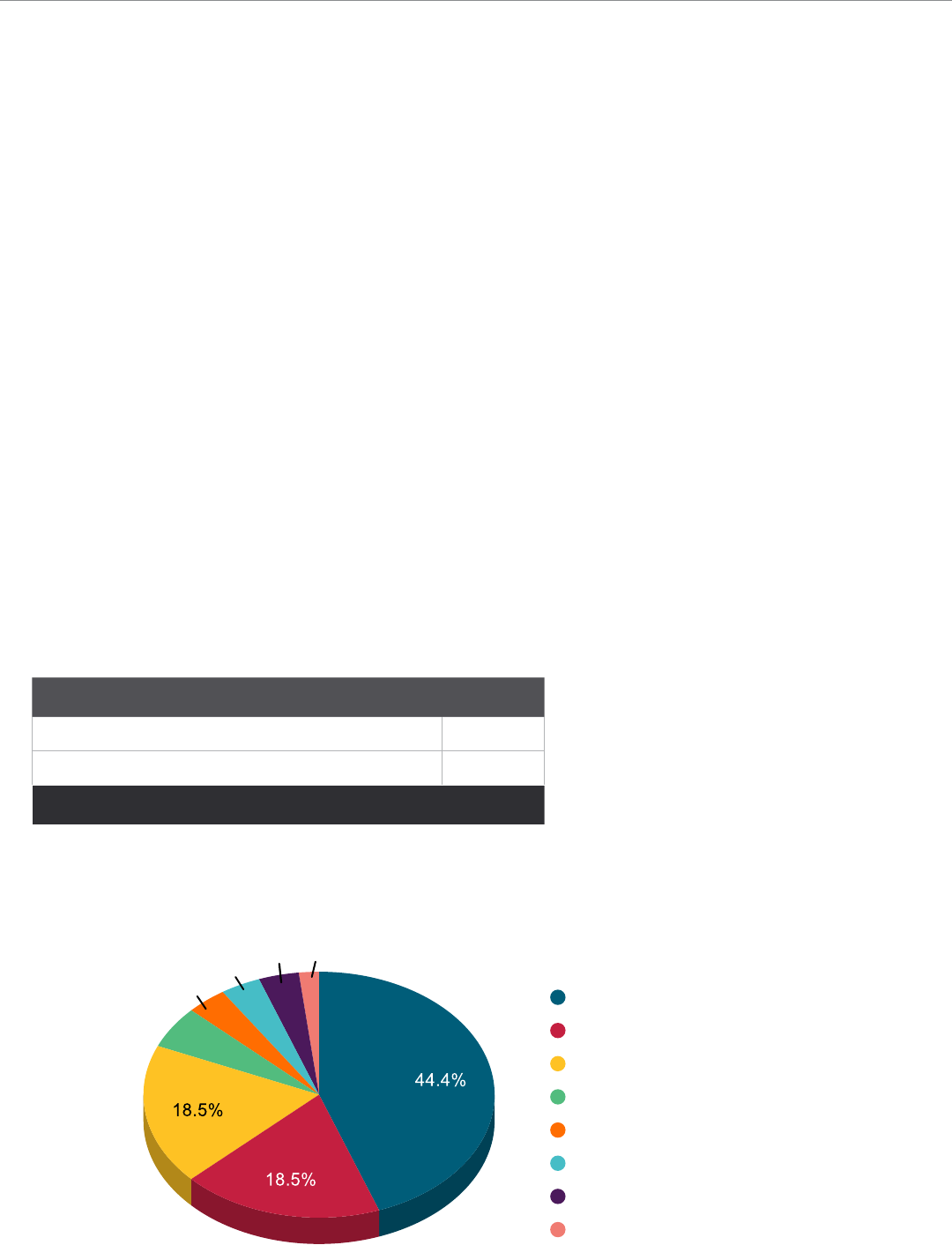
Page 38 of 84
Financial Regulation Annual Report 2023
5.6%
1.9%
3.7%
3.7%
3.7%
Mortgage (24)
Debt Relief Services (10)
Loans (10)
Credit Reporting Agency (3)
Credit Services Business (2)
Non-Jurisdictional (2)
State-Chartered Credit Union (2)
Money Services Business (1)
FY23 New Enforcement Investigations
(52 Total New Investigations)
The Office also participated in a multistate investigation against a
mortgage loan servicer concerning allegations that three affiliated
companies were involved in a major personal identifiable information
data breach. The entities reported that approximately 5.8 million
consumers, including 124,000 Maryland consumers, were impacted.
The entities failed to notify OFR of this alleged data breach as required
by regulation. The Office contributed a cyber auditor to the multistate
examination to determine the scope and impact of the data breach.
In July 2022, OFR entered into a consent order with a credit service
business Phantom Ventures, Inc. (“Phantom”) for unlawful practices
associated with mortgage loan modification consulting services
offered in Maryland. The consent order cited Phantom’s violations
of the Protection of Homeowners in Foreclosure Act for collecting
compensation from consumers prior to fully performing contracted
services in violation of Real Property (RP) § 7-307(2), failing to provide
Notice of Rescission to consumers in violation of RP § 7-305, and for
failing to provide a signed and dated copy of the written agreement to
consumers in violation of RP § 7-306; as well as violating the Maryland
Mortgage Assistance Relief Services Act (MARS) for requesting and/
or receiving payment of any fee or consideration prior to consumers
obtaining a mortgage loan modification in violation of RP § 7-502
& CFR 1015.5(a), failing to provide proper disclosures in commercial
communications with consumers in violation of RP § 7-502 (MARS)
& CFR 1015.4(b), failing to provide proper disclosures when advising
consumers to stop making mortgage payments in violation of RP § 7-502
& CFR 1015.4(c), and for failing to investigate
consumer complaints in violation of RP §
7-502 & CFR 1015.9(b)(iii)(2). Pursuant to the
settlement, Phantom agreed to cease and
desist from originating, making or otherwise
offering mortgage assistance relief services
and/or foreclosure consulting activities with
Maryland consumers, either directly or indirectly
through a third-party, pay a penalty of $10,000
to the Commissioner, and make payments to
the 15 consumers identified by OFR during its
investigation in the cumulative amount
of $27,840.
In the matter of Bangladesh Christian
Cooperative Society, LLC (BCCS), OFR issued
a Summary Order to Cease and Desist and
Order to Produce after finding grounds to allege
BCCS’s activities constituted the unauthorized
operations of a credit union in violation of
Maryland law and unlicensed lending to Maryland
consumers in violation of Maryland Consumer
Lending Laws. The Office found that it was in the
public interest that BCCS cease and desist from
continuing operation as a credit union and making
loans or otherwise engaging in lending activities
with Maryland consumers. The Office prohibited
BCCS from making loans or advances of money
or credit of any nature whatsoever, renewing
any loans, modifying the terms of any loans,
collecting payments on or otherwise servicing
loans, discharging loans, selling, transferring or
assigning any loans, taking possession of any
collateral associated with any loans and making
any payments to vendors, salaries, dividends
and interest.
Type Amount
Consumer Restitution (assessed) $27,840
Civil Penalties (collected) $40,162
Total $68,002
Enforcement: FY 2023 Monetary Recoveries
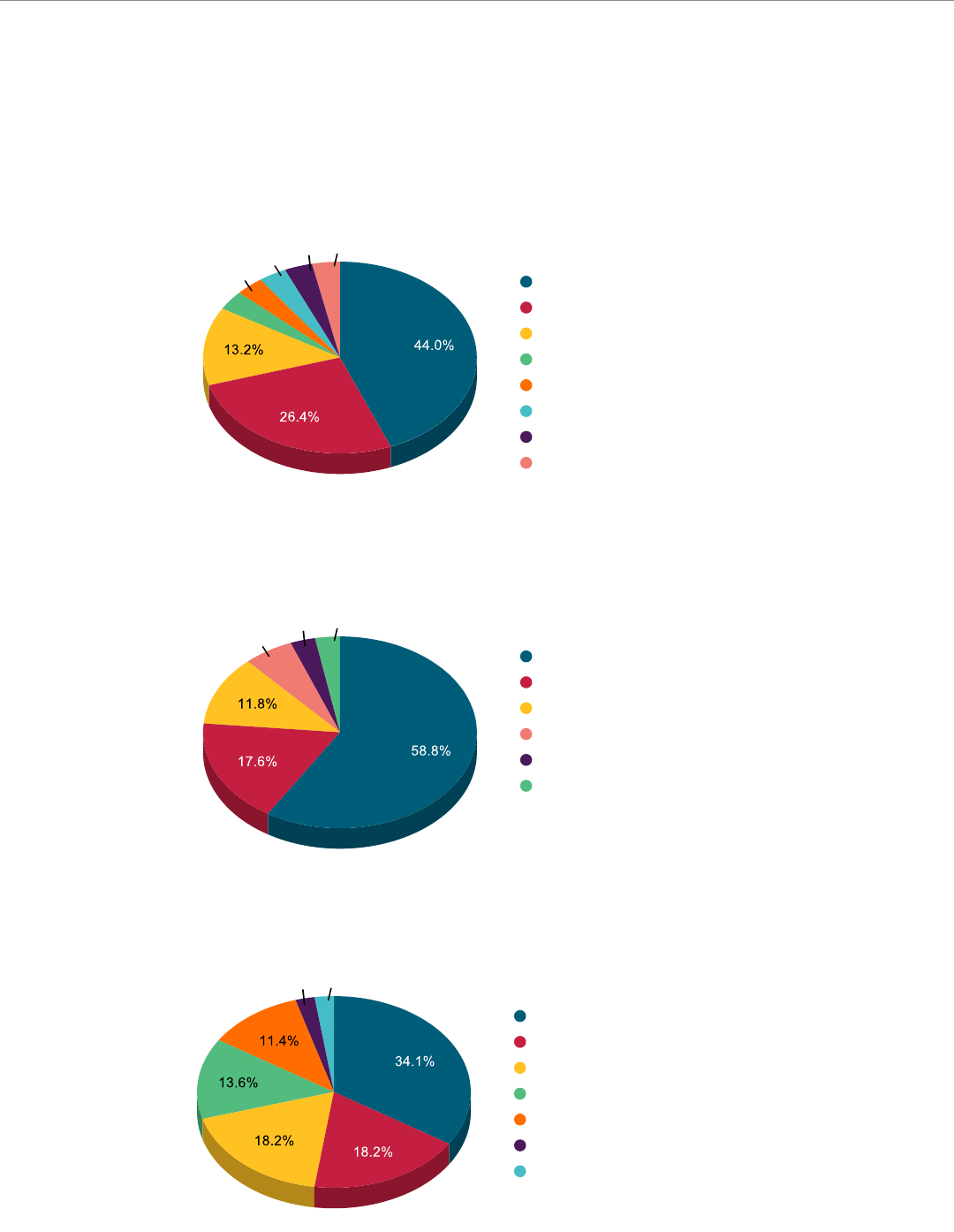
Page 39 of 84
Financial Regulation Annual Report 2023
Due to a coding error in case management software, the number of new investigations reported in fiscal years 2020
through 2022 were inaccurate. The Office is providing revised pie charts for those three fiscal years below.
3.3%
3.3%
3.3%
3.3%
3.3%
Mortgage (40)
Loans (24)
Debt Relief Services (12)
Credit Reporting Agency (3)
Credit Services Business (3)
Money Services Business (3)
Non-Jurisdictional (3)
State-Chartered Credit Union (3)
FY22 New Enforcement Investigations
(91 Total New Investigations)
2.9%
5.9%
2.9%
Mortgage (20)
Loans (6)
Debt Relief Services (4)
Money Services Business (2)
State-Chartered Bank (1)
Student Loan (1)
FY21 New Enforcement Investigations
(34 Total New Investigations)
2.3%
2.3%
Mor tgage (15)
Credit Services Business (8)
Debt Relief Services (8)
Student Loan (6)
Loans (5)
Money Services Business (1)
State-Chartered Bank (1)
FY20 New Enforcement Investigations
(44 Total New Investigations)

Financial Regulation Annual Report 2023 Page 40 of 84

Page 41 of 84
Financial Regulation Annual Report 2023
FORECLOSURE SYSTEMS
Three residential foreclosure-related reporting mandates fall under the authority of the Office: Notices of Intent to
Foreclose (NOI), Notices of Foreclosure (NOF), and Foreclosed Property Registrations (FPR). All three notices/
registrations must be submitted to OFR electronically through a secure online interface.
Office staff are responsible for oversight of the reporting process and, with support from the Maryland Department of
Labor’s Office of Information Technology, the development and maintenance of the electronic system and databases.
An NOI is mailed by the secured party of the mortgage in default to the borrower at least 45 days prior to the
foreclosure action being filed in court, and a copy of the NOI is required to be electronically submitted to OFR. The
NOI provides crucial information about the mortgage and instructions to the borrower for pursuing an alternative to
foreclosure. Copies of all NOIs must be submitted to OFR through the electronic system. The data received by OFR is
used to facilitate its various supervisory responsibilities and outreach activities.
An NOF is an electronic registration submitted to OFR within seven days of the filing of the Order to Docket or Complaint
to Foreclose (the initial court filing that starts the legal foreclosure process) by the party authorized to foreclose. The
NOF provides ownership information about properties in the beginning stages of the foreclosure process and is used
by Maryland county and municipal officials to better facilitate code enforcement, nuisance abatement, law enforcement,
public health, and other related activities that fall under the purview of local governments.
An FPR is an electronic registration submitted to OFR within 30 days of the foreclosure sale by the party purchasing the
property. The FPR provides ownership information about foreclosed properties near the end of the foreclosure process.
Like the NOF, the FPR is used by Maryland county and municipal officials to better facilitate code enforcement, nuisance
abatement, law enforcement, public health, and other related activities that fall under the purview of local governments.
In April 2020, in response to the COVID-19 pandemic, OFR closed the electronic NOI system in accordance with
an executive order. The system remained closed through FY 2021. The closure of the NOI system virtually halted
the initiation of residential foreclosures in Maryland. With the reopening of the NOI system at the start of FY 2022,
foreclosure activity resumed, and during FY 2023 NOIs returned to pre-pandemic levels. However, NOFs and FPRs
remained below pre-pandemic levels throughout FY 2023.
In FY 2023, OFR began posting on the Maryland Open Data Portal the number of foreclosure notices and registrations
received by the Office. The numbers of NOIs, NOFs and FPRs are updated monthly and aggregated by Maryland county.
An additional posting of the number of NOIs aggregated by zip code is also updated monthly. For direct links to the
Open Data Portal, see the Foreclosure Data Tracker page on OFR’s website at labor.maryland.gov/finance/consumers/
frforeclosuredatatracker.shtml.
Oversight of the Electronic Reporting System for Foreclosure Notices and Registrations
ADMINISTRATION
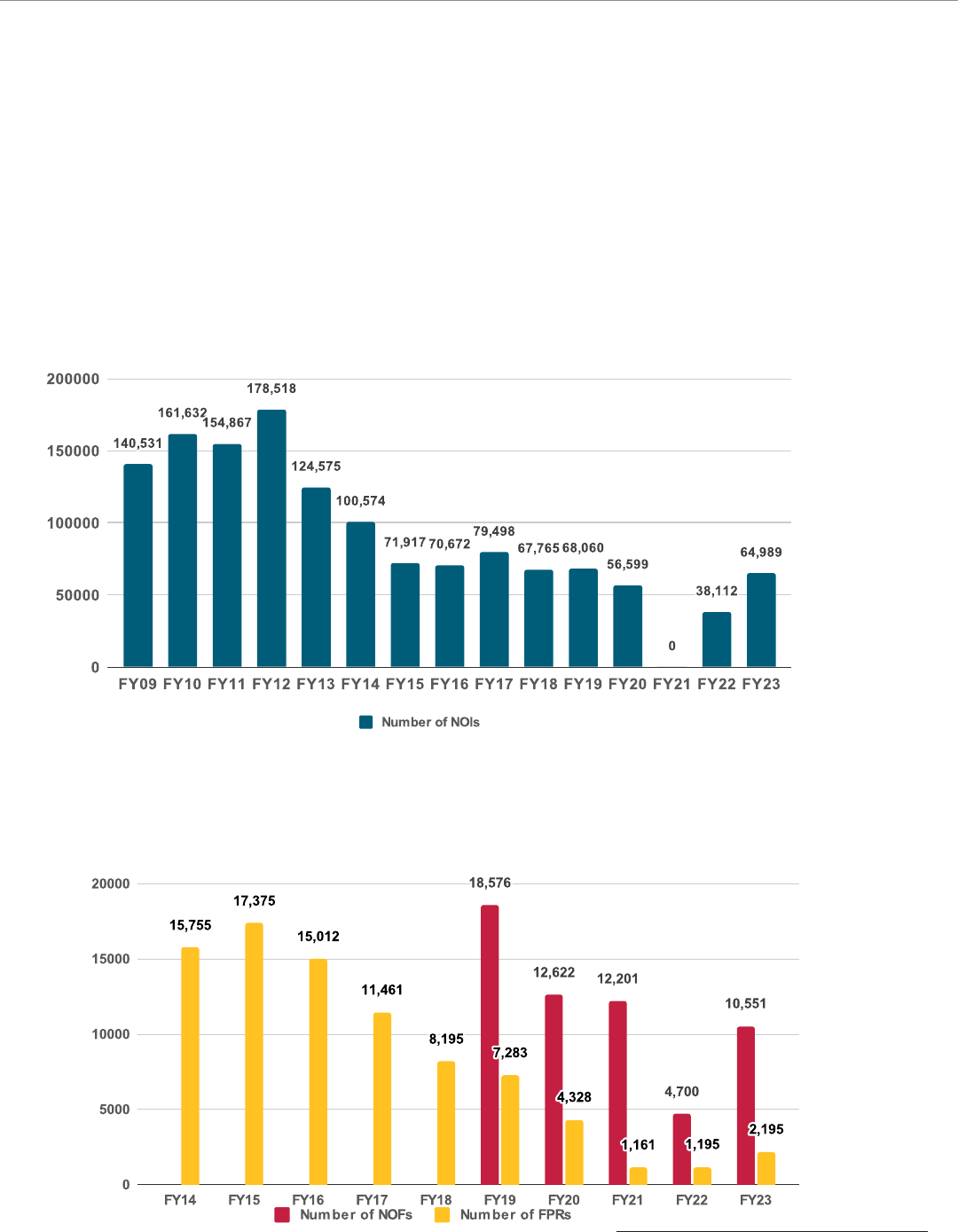
Page 42 of 84
Financial Regulation Annual Report 2023
FORECLOSURE SYSTEMS
ADMINISTRATION
Oversight of the Electronic Reporting System for Foreclosure Notices and Registrations
Notices of Intent to Foreclose
Received per Fiscal Year
Notices of Foreclosure (NOFs) and Foreclosed Property Registrations (FPRs)
Received per Fiscal Year*
* NOF requirement went into effect October 2018.
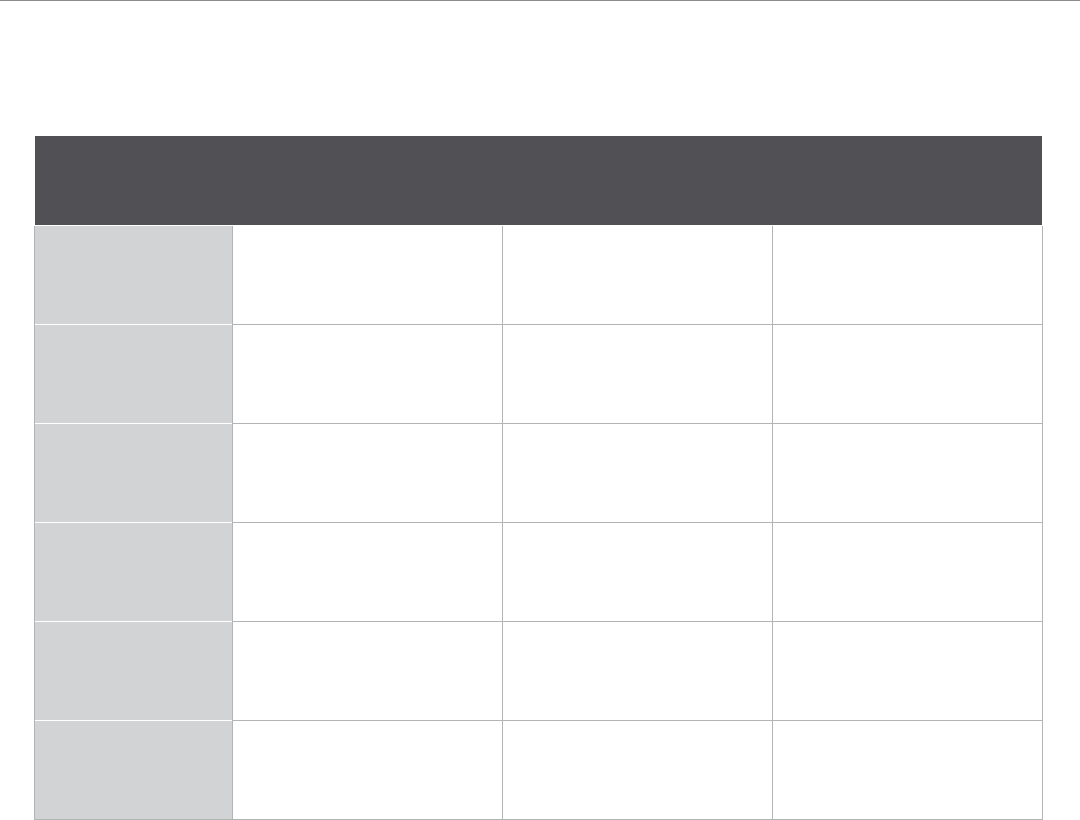
Page 43 of 84
Financial Regulation Annual Report 2023
Foreclosure Systems: FY 2023 Summary Table
Notice of Intent
to Foreclose (NOI)
Notice of
Foreclosure (NOF)
Foreclosed Property
Registration (FPR)
Number Received
by OFR
64,989 10,551 2,195
Stage of
Foreclosure
Mortgage or other
contractual default
Foreclosure action filed
in court
Foreclosure
sale/auction
Reporting
Requirement
After the first missed payment
and no less than 45 days prior
to foreclosure action filing
Within 7 days
of filing
Within 30 days of sale (initial
FPR) and within 30 days of
deed recordation (final FPR)
Person
Submitting
Secured party
(or their agent)
Person authorized to make
the foreclosure sale
(or their agent)
Foreclosure sale purchaser
(or their agent)
Requirement
Effective Date
January 2011 (for electronic
submission)
October 2018 October 2012
Primary User
and Purpose
Office of
Financial Regulation –
supervision and outreach
Maryland local or state
governments – nuisance
abatement and other
related activities
Maryland local or state
governments – nuisance
abatement and other
related activities

Financial Regulation Annual Report 2023 Page 44 of 84

Page 45 of 84
Financial Regulation Annual Report 2023
STATE COLLECTION AGENCY
Regulating the Debt Collection Industry in Maryland
The State Collection Agency Licensing Board was established by the Maryland General Assembly in 1977 and resides
within the Office. The Board has statutory responsibility for the licensing of consumer debt collection agencies operating
in Maryland. The Governor, with the consent of the Senate, appoints two consumer representatives and two industry
representatives to the Board. The Commissioner of Financial Regulation serves as the Board’s Chairman.
Office personnel provide administrative and technical support for the Board, managing functions such as the processing
of license applications, the investigation of consumer complaints, enforcement actions, and outreach activity. Staff
members provide regular reports to the Board on these and other matters. Legal counsel is provided to the Board by the
Assistant Attorneys General assigned to the Office.
During FY 2023, the Board met monthly to make licensing decisions and address emerging issues pertinent to its
mission and responsibilities. During FY 2023, the Board approved new licenses for 89 collection agencies and an
additional 57 branch locations. As of the end of FY 2023, the Board had licensed 1,103 individual collection agencies
and 468 associated branch offices.
In order to remain connected to multistate activities and informed on nationwide trends, the Board continues to
actively participate in the North American Collection Agency Regulatory Association (NACARA). NACARA is a
trade association of regulator members with the primary purpose of ensuring fair and equitable administration and
enforcement of collection agency regulatory laws. In FY 2023, a staff member was re-appointed as Chair for the
NACARA Annual Conference Planning Committee. Moreover, members of the Board and Office staff attended
NACARA’s 2022 Annual Conference in Nashville. By participating in discussions surrounding multi-state coordination,
the Board plays an active role within the state regulatory community and provides meaningful input into coordinated
debt collection supervision nationwide.
During FY 2023, two vacancies on the Board were filled. Board membership as of June 30, 2023 was:
Chairman: Antonio P. Salazar
Industry Member: Sandra Holland
Industry Member: Shawn Kennedy
Consumer Member: Eric Friedman
Consumer Member: Tracy Rezvan
LICENSING BOARD

Page 46 of 84
Financial Regulation Annual Report 2023
On May 15, 2018, the Financial Consumer
Protection Act of 2018 (2018 Md. Laws 732)
(“2018 Consumer Protection Act”) was signed
into law establishing a Student Loan Ombudsman
to be designated by the Commissioner. The
Ombudsman position was created to provide
student loan borrowers with a state-level office
that can assist them in resolving their complaints
about student loan servicers.
The Ombudsman is also required to monitor
and disseminate information about student loan
servicing activity in Maryland in order to inform
the public and legislature, provide pertinent
analysis and any recommendations to the General
Assembly and to establish, in consultation with
the Commissioner, a student loan borrower
education course by October 1, 2019. Finally, the
Ombudsman is empowered, through subsequent
legislation discussed below, to refer any violations
of student loan servicing standards or instances
of abusive, unfair, deceptive, or fraudulent
practices to the Office’s Enforcement Unit or
to the Maryland Office of the Attorney General
for civil enforcement or criminal prosecution.
The Office began implementation of the 2018
Consumer Protection Act in FY 2019. The
Ombudsman continues to be supported by Office
staff in developing OFR’s capabilities to provide
student loan-related information to the public and
to act as a liaison between Maryland student loan
borrowers and student loan servicers. In this role
as a liaison, the Ombudsman seeks correction
of mistakes and facilitates solutions to student
loan borrowers’ issues.
In 2020, the Ombudsman published a Student
Loan Borrower’s Bill of Rights for Maryland
residents. Based on the 2018 Act and 2019
legislation that enhanced it, the Bill of Rights
provides guidance to Maryland residents who are
repaying student loans. The document succinctly
describes, in plain language, the protections to
which borrowers are entitled as well as clearly
stating the standards that student loan servicers
must meet related to responsiveness, payment
allocation, record retention, and reporting to credit bureaus. The Student
Loan Borrower’s Bill of Rights is intended to serve as a tool for student
loan borrowers to use in their interactions with their loan servicers. The
Student Loan Borrower’s Bill of Rights is available on OFR’s website at
labor.maryland.gov/finance/consumers/frslbillofrights.pdf.
In FY 2023, the Ombudsman provided testimony to the Maryland
Legislature on bills that would impact borrowers. The Ombudsman
also began planning to implement House Bill 913 – Financial Institutions
- Student Financing Companies - Required Registration and Reporting.
The new law requires student financing companies to register with
OFR through NMLS and to report to OFR 15 data points beginning
March 15, 2024. The law goes into effect October 1, 2023. Additionally,
the Ombudsman is preparing to update the website with recent law
and regulatory changes from the Department of Education. Finally, the
Ombudsman began planning the creation of materials that Maryland
State agencies, nonprofits, and others can use to inform their staff
about Public Service Loan Forgiveness.
In FY 2023, the Ombudsman began offering video chat appointments
when helpful to borrowers. Throughout FY 2023, the Ombudsman
continued to assist student loan borrowers with their inquiries and
remained engaged with the U.S. Department of Education and
counterparts in other states on developments regarding student loan
account transfers, return to repayment after the pandemic-related
payment pause for federal loans, and the Public Service Loan Forgiveness
issues. The Ombudsman presented to four different stakeholder
groups about student loans, repayment options, and the role of the
Ombudsman’s Office in Maryland. The stakeholder groups included
legal advocates, financial aid administrators, consumer representatives,
and members of the Financial Education and Capability Commission.
The Ombudsman also participated in the Commissioner’s quarterly
listening sessions with Maryland statewide consumer advocacy leaders
to keep them apprised of student loan industry developments. Complete
details of the activities of the position are available in the Ombudsman’s
Annual Reports, which are submitted to the General Assembly each year.
STUDENT LOAN
Monitoring the Student Loan Servicing Industry and Assisting Student Loan Borrowers
OMBUDSMAN

Page 47 of 84
Financial Regulation Annual Report 2023
OUTREACH AND
Informing Stakeholders and Educating Consumers
The Outreach Unit is responsible for conducting and coordinating
outreach and education to consumers, industry, government,
and nonprofit partners about issue areas within the jurisdiction of
the Office. The Unit’s outreach to stakeholder groups provides
information and training about OFR’s authority and new and existing
laws, while also giving OFR an opportunity to solicit feedback from
those same stakeholders. The Unit’s consumer-focused activities
educate Maryland residents of their rights under State law and
provide information about the role of the Office, including OFR’s
authority to investigate complaints about regulated financial
service providers and activities. In FY 2023, the Unit organized or
participated in 42 events, conferences, and stakeholder meetings
on behalf of OFR.
The Outreach Unit continues to maintain OFR’s website pages and
manage electronic communications. In FY 2023, the Unit created four
new consumer-focused web pages on bank and credit union topics
(account fees, deposit insurance, state and federal regulation, and
where to submit consumer complaints). The Unit also issued 15
industry and consumer advisories and drafted social media posts
and press releases throughout the year.
In the last quarter of FY 2023, the Unit began implementation of
House Bill 379/Senate Bill 929 (Commissioner of Financial Regulation
- Name and Organization of Office), which passed during the 2023
Maryland General Assembly session and became effective at the start
of FY 2024, on July 1, 2023. The new law changes the name of the
Office to the “Office of Financial Regulation’’ (from the “Office of the
Commissioner of Financial Regulation”). The Office’s name change
required revisions to the Office’s official seal, and subsequently all
outreach and communication materials needed to be reviewed,
updated and rebranded, including webpages, factsheets and
brochures, presentation and advisory templates, and event
materials/giveaways.
The Unit also hired an additional staff person in FY 2023. The
“Outreach and Education Associate” is a new position created to
provide support and in-house technical expertise to the Director
of Outreach and Education, primarily in the areas of graphic design
and electronic communications.
Stakeholder Outreach
Throughout FY2023 the Outreach Unit remained engaged with a
variety of industry and government partners, and was in frequent
communication with leadership and staff of nonprofit consumer
advocacy groups, financial education practitioners, and community
organizations. The Unit provided updates to these stakeholders
about the activities of the Office and shared
information about the financial service industries
and activities regulated by OFR and consumer
complaint investigations.
The Unit’s stakeholder outreach in FY 2023
included:
• Organizing and hosting an informational
Q&A session for mortgage servicers about
Maryland HAF. This webinar was presented
in partnership with Maryland DHCD as
a follow-up session to the HAF webinar
hosted by OFR in FY 2022.
• Conducting OFR’s third annual “Regulatory
Highlights” webinar, a live-streamed event
for regulated industries and interested
consumer groups, during which OFR
staff and leadership provided legislative,
supervisory, and enforcement updates.
The webinar was attended by 274
individuals and the recording has
been viewed 52 times.
• Conducting two webinars on climate
change risks for Maryland-chartered
banks and credit unions. The webinars
provided guidance from the Commissioner
with respect to the financial institutions’
handling of the various risks posed by
climate change and on the establishment
of governance structures to manage
those risks.
• Conducting seven webinars for nonprofit
housing counselors, financial educators,
and legal service agencies about OFR’s
authority in the foreclosure process,
consumer complaint investigations, and
consumer financial protections enforced
by OFR. The Unit also provided updates
on foreclosure data and OFR’s regulatory
activities during meetings for the COVID-19
Housing Preservation Coalition and the
Community Development Network of
Maryland.
EDUCATION

Page 48 of 84
Financial Regulation Annual Report 2023
• Hosting four virtual “Listening Sessions with the Commissioner”
with statewide consumer advocacy leaders.
• Presenting about the Foreclosure Registration System during a
staff meeting for the Baltimore City Planning Department. The
Foreclosure Registration System is an online reporting database
for lenders and foreclosure purchasers overseen by OFR - the
data available in the Foreclosure Registration System is accessible
to local governments to assist with nuisance abatement and
other issues that may arise from foreclosed properties in their
jurisdictions.
• Participating in the Maryland Association of Counties
Conference’s two-day exhibitor hall to share information with
Maryland’s local officials about the services provided by OFR,
with an emphasis on the Foreclosure Registration System.
Outreach staff and OFR leadership continued to participate in
meetings of the General Assembly’s Financial Education and
Capability Commission, the Maryland Project SAFE (“Stop Adult
Financial Exploitation”) partnership, and numerous regional meetings
with nonprofit housing counseling, legal service, and community
development agencies.
Consumer Education
The Outreach Unit’s consumer-focused activities involve direct-to-
consumer education in the form of written or electronic materials,
including videos, presentations, advisories and factsheets, or through
engagement at public events. The Unit partners with local nonprofits
and other state or federal agencies as a participant in their financial
education events or public campaigns. The Outreach Unit also
provides support to the Student Loan Ombudsman by assisting with
outreach to Maryland student loan borrowers about their rights and
responsibilities and providing information to
borrowers and stakeholders on how to access
additional state and federal resources.
In FY 2023, Outreach Unit staff participated
in six in-person outreach events organized by
nonprofit or government agencies, and served
as a panelist on a live-streamed foreclosure
prevention webinar for homeowners organized
by the Montgomery County Office of Consumer
Protection. The Unit also manages OFR’s direct
outreach to homeowners at risk of foreclosure
by mailing informational letters and resource
factsheets to those who have received
foreclosure warning notices (“Notices of
Intent to Foreclose’’) from their lenders. Over
79,462 foreclosure outreach letters were
mailed in FY 2023.
The Outreach Unit coordinated the Office’s
participation in 2023 Protect Week, an annual
statewide public education campaign that arose
out of a collaboration between federal, state,
and local nonprofits and government agencies
to highlight the growing problem of financial
abuse of older Marylanders. During 2023
Protect Week, Commissioner Salazar spoke at
a press conference with other agency leaders,
including representatives from the Maryland
Office of the Attorney General, Maryland
Comptroller’s Office, Maryland Department
of Aging, Maryland Department of Human
Services, AARP of Maryland, and the U.S.
Department of Justice. Commissioner Salazar
also participated in a live-streamed interview
with AARP where he discussed smartphone
apps and peer-to-peer payment services,
describing the Office’s role in regulating these
emerging technologies and in protecting
Maryland’s older consumers from financial
exploitation generally. Outreach Unit staff
participated in two public resource fairs for
older adults during Protect Week.
OFR Outreach staff with hometown baseball team mascot,
the Baltimore Oriole.

Financial Regulation Annual Report 2023 Page 49 of 84
$
Facts and figures for
state-chartered and
depository financial
institutions, financial
statements for the
Office, and historical
lists of Commissioners.
APPENDICES

Page 50 of 84
Financial Regulation Annual Report 2023
Fig 1 Consolidated Statement of Financial Condition – State-Chartered Banks Page 51
Fig 2 Ratios from Consolidated Statements of Financial Condition of All State-Chartered Banks Page 52
Fig 3 Bank Prior Period End Totals Page 53
Fig 4 State-Chartered Bank Growth Trends Page 53
Fig 5 State-Chartered Commercial Banks & Savings Banks – Principal Location, Assets, & CRA Ratings Page 54
Fig 6 Other Banks Operating in Maryland – Principal Location, Deposits, & Branches Page 55
Fig 7 National Banks & Federal Savings Banks Headquartered in Maryland – Principal Location & Total Assets Page 57
Fig 8 FDIC Insured Banks - Trend Year-Over-Yearr Page 57
Fig 9 Consolidated Statement of Financial Condition – State-Chartered Credit Unions Page 58
Fig 10 Ratios from Consolidated Statements of Financial Condition-All State-Chartered Credit Unions Page 58
Fig 11 Credit Union Prior Period End Totals Page 59
Fig 12 State-Chartered Credit Union Growth Trends Page 59
Fig 13 State-Chartered Credit Unions – Assets and Field of Membership Typese Page 60
Fig 14 Selected Balance Sheet Items – State-Chartered Credit Unions Page 60
Fig 15 NCUA Insured Credit Unions - Trend Year-Over-Year Page 61
Fig 16 Federal Credit Unions – Operating Branches in Maryland Page 61
Fig 17 Federal Credit Unions – Headquartered in Maryland Page 62
Fig 18 State-Chartered Non-Depository Trust Companies – Location and Business Type Page 64
Fig 19 Trust Assets Reported by State-Chartered Trust Companies Page 64
Fig 20 State-Chartered Trust Companies Asset Growth Trends Page 65
Fig 21 Maryland Trust Companies Asset Growth Trends Page 65
Fig 22 Banks, Credit Unions, and Trust Companies Page 66
State-Chartered and Depository Institutions – Facts & Figures
APPENDIX A:

Page 51 of 84
Financial Regulation Annual Report 2023
FIGURE 1. Consolidated Statement of Financial Condition – State-Chartered Banks
Fiscal Years Ended June 30th (in thousands)
ASSETS FY 2023 FY 2022 FY 2021
% Change
FY22-FY23
Non-Interest Bearing & Currency/Coin $316,683 $423,732 $452,072 -25.26%
Interest Bearing Balances $2,753,030 $3,414,331 $4,153,113 -19.37%
Securities $7,903,790 $7,500,538 $5,867,990 5.38%
Federal Funds Sold and Securities Purchased Under
Agreements to Sell
$32,644 $121,033 $445,109 -73.03%
Loans and Leases, Net of Unearned Income $36,161,514 $33,411,669 $32,272,396 8.23%
(Allowance for Loan and Lease Losses) -$450,773 -$362,170 -$391,771 24.46%
Trading Account Assets $30,702 $18,630 $5,548 64.80%
Premises and Fixed Assets (including capitalized leases) $397,001 $377,000 $443,404 5.31%
Other Real Estate Owned $10,914 $16,916 $36,703 -35.48%
Intangible Assets $630,389 $630,586 $686,711 -0.03%
Other Assets $1,439,968 $1,227,784 $1,204,965 17. 28%
Total Assets $49,676,635 $47,142,219 $45,568,011 5.38%
LIABILITIES FY 2023 FY 2022 FY 2021
% Change
FY22-FY23
Total Deposits $40,296,292 $40,559,095 $38,303,678 -0.65%
Federal Funds Purchased & Repurchase Agreements $271,271 $320,198 $274,748 -15.28%
Trading Liabilities $32,341 $17,673 $5,721 83.00%
Subordinated Debt $ - $ - $30,543 -%
Other Borrowed Funds $3,162,434 $768,473 $1,105,018 311.52%
Other Liabilities $524,716 $387,413 $364,808 35.44%
Total Liabilities $44,287,054 $42,052,852 $40,084,516 5.31%
EQUITY CAPITAL FY 2023 FY 2022 FY 2021
% Change
FY22-FY23
Perpetual Preferred Stock $ - $ - $ -
Common Stock $121,681 $123,563 $138,521 -1.52%
Surplus $3,167,020 $3,054,733 $3,043,551 3.68%
Undivided Profits and Capital Reserves $2,100,880 $1,911,071 $2,301,423 9.93%
Total Equity Capital $5,389,581 $5,089,367 $5,483,495 5.90%
Total Liabilities and Equity $49,676,635 $47,142,219 $45,568,011 5.38%
SOURCE: OFR compiled using FDIC data tools

Page 52 of 84
Financial Regulation Annual Report 2023
FIGURE 2. Ratios from Consolidated Statements of Financial Condition of All State-Chartered Banks
Fiscal Years Ended June 30th
Year Ended June 30th FY 2023 FY 2022 FY 2021 FY 2020
Return on Assets 1.35% 1.49% 1.67% 0.50%
Net Interest Margin 3.66% 3.53% 3.49% 3.61%
Total Loans to Total Deposits 89.74% 82.38% 84.25% 96.39%
Total Loans to Core Deposits 115.87% 92.58% 96.31% 110.92%
Total Loans to Total Assets 72.79% 70.87% 70.82% 77.47%
ALLL* to Total Loans 1.23% 1.07% 1.20% 1.28%
Noncurrent Loans to Total Loans 0.77% 0.47% 0.88% 0.84%
Tier 1 Leverage Capital 13.38% 10.61% 10.99% 10.57%
Tier 1 Risk-Based Capital ** ** ** **
Total Risk-Based Capital 14.31% 14.19% 15.92% 14.13%
Common Equity Tier 1 Capital ** ** ** **
* = Allowance for Loan and Lease Losses
** As of March 2020, not available for institutions that have elected the Community Bank Leverage Ratio (CBLR) framework
and not available for most standard peer groups.
SOURCE: OFR calculated
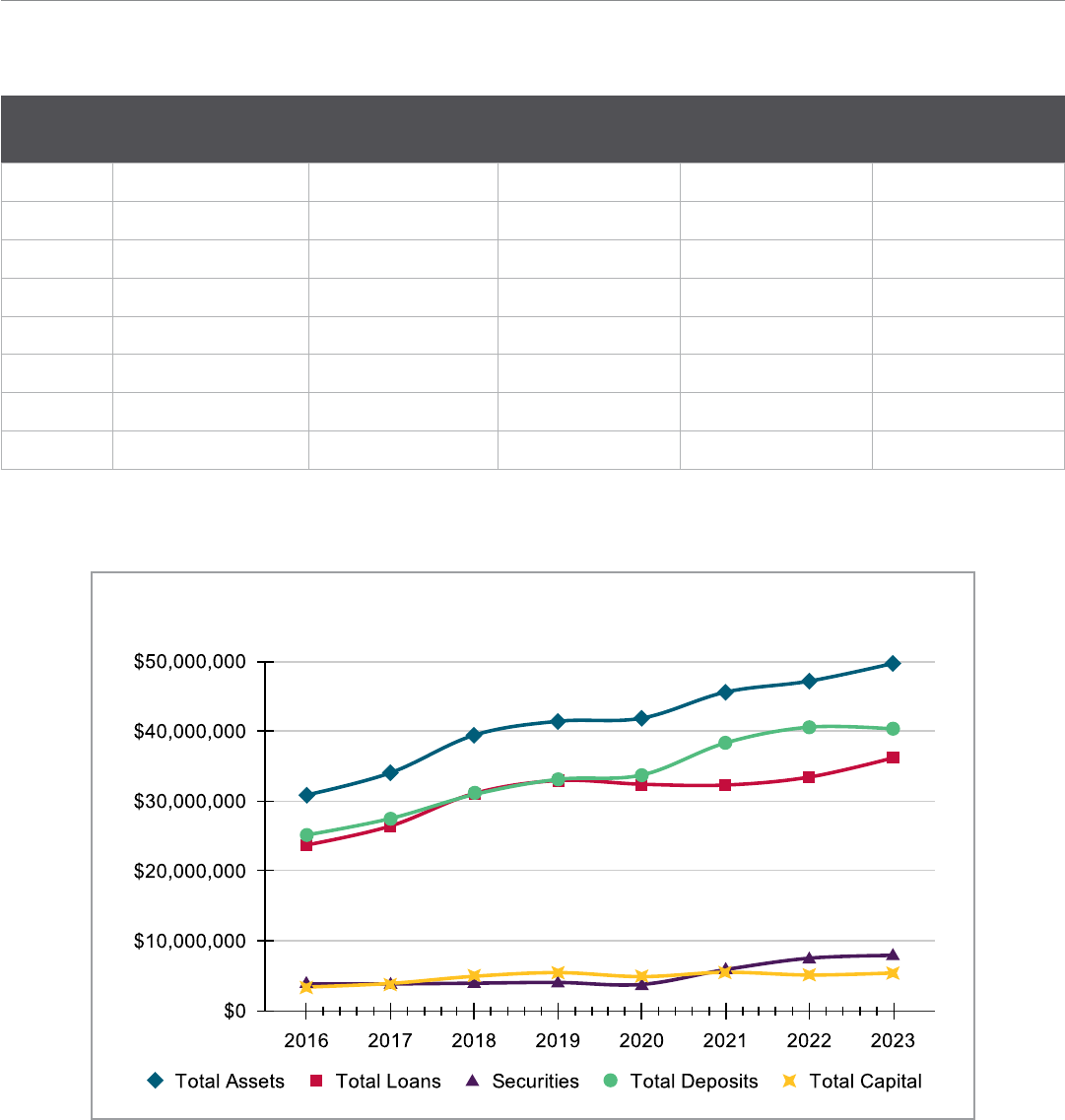
Page 53 of 84
Financial Regulation Annual Report 2023
FIGURE 4. State-Chartered Bank Growth Trends
FIGURE 3. Bank Prior Period End Totals
Fiscal Years Ended June 30th (in thousands)
YEAR TOTAL ASSETS TOTAL LOANS SECURITIES TOTAL DEPOSITS TOTAL CAPITAL
2023 $49,676,635 $36,161,414 $7,903,790 $40,296,292 $5,389,581
2022 $47,142 ,219 $33,411,669 $7,500,538 $40,559,095 $5,089,367
2021 $45,568,011 $32,272,467 $5,867,990 $38,303,678 $5,483,495
2020 $41,836,704 $32,387,626 $3,747,885 $33,705,264 $4,862,555
2019 $41,398,131 $32,918,168 $4,027,665 $33,083,982 $5,437,638
2018 $39,409,185 $31,067,419 $3,922,176 $30,921,037 $4,910,628
2017 $34,018,542 $26,405,546 $3,820,310 $27,478,399 $3,889,011
2016 $30,855,474 $23,696,672 $3,825,527 $25,124,361 $3,369,988
SOURCE: OFR compiled using FDIC data tools

Page 54 of 84
Financial Regulation Annual Report 2023
FIGURE 5. State-Chartered Commercial Banks and Savings Banks – Principal Location, Assets, and CRA Ratings
Fiscal Year Ended June 30, 2023
BANK NAME
PRINCIPAL
LOCATION
TOTAL
ASSETS (in
thousands)
TOTAL
DEPOSITS (in
thousands)
TOTAL
BRANCHES
NO. OF LMI
BRANCHES
(as % of
total)*
CRA
RATING
The Bank of Glen Burnie Glen Burnie $363,583 $329,315 8 0 (0%) Satisfactory
Bank of Ocean City Ocean City $629,468 $570,544 6 0 (0%) Satisfactory
BayVanguard Bank Baltimore $912,123 $730,497 15 2 (13%) Outstanding
Calvin B. Taylor Banking Company of
Berlin, Maryland
Berlin $884,795 $784,435 13 3 (23%) Satisfactory
Cecil Bank Elkton $226,591 $196,974 4 1 (25%) Satisfactory
CFG Bank Baltimore $5,075,789 $4,523,257 3 0 (0%) Satisfactory
The Chesapeake Bank and Trust Co. Chestertown $122,685 $99,820 3 0 (0%) Satisfactory
Community Bank of the Chesapeake Waldorf $2,460,952 $2,138,028 12 2 (17%) Satisfactory
EagleBank Bethesda $10,982,157 $7,754,101 15 2 (13%) Satisfactory
Farmers and Merchants Bank Upperco $730,236 $633,576 8 0 (0%) Satisfactory
The Farmers Bank of Willards Willards $550,015 $453,030 8 0 (0%) Satisfactory
First United Bank & Trust Oakland $1,906,497 $1,594,658 26 5 (19%) Satisfactory
Forbright Bank Potomac $6,612,085 $5,694,472 5 1 (20%) Satisfactory
Glen Burnie Mutual Savings Bank Glen Burnie $108,477 $99,061 1 0 (0%) Satisfactory
The Harbor Bank of Maryland Baltimore $372,757 $332,404 7 5 (71%) Satisfactory
Harford Bank Aberdeen $626,262 $538,253 10 2 (20%) Satisfactory
Hebron Savings Bank Hebron $750,974 $662,212 13 4 (31%) Satisfactory
Middletown Valley Bank Middletown $974,307 $854,584 8 1 (13%) Satisfactory
The Peoples Bank Chestertown $319,859 $289,314 7 1 (14%) Satisfactory
The Queenstown Bank of Maryland Queenstown $676,818 $594,144 9 0 (0%) Satisfactory
Sandy Spring Bank Olney $13,987,426 $11,041,547 56 8 (14%) Satisfactory
Woodsboro Bank Woodsboro $402,779 $382,066 5 3 (14%) Satisfactory
TOTAL MD CHARTERED BANKS: 22 $49,676,635 $40,296,292 242 40 (17%)
TOTAL OTHER BANKS OPERATING IN MD: 55** $159,436,149 1,016
* Branch LMI designations may vary year-to-year due to annual changes in census tract income levels.
** See Figure 6 for detailed list of other banks operating in Maryland.
SOURCE: FFIEC and State-Chartered Bank websites

Page 55 of 84
Financial Regulation Annual Report 2023
FIGURE 6. Other Banks Operating in Maryland – Principal Location, Deposits, and Branches
Fiscal Year Ended June 30, 2023
BANK NAME
STATE
(Headquartered)
TOTAL DEPOSITS
in MD
(in thousands)
TOTAL
BRANCHES
in MD
ACNB Bank PA $620,338 9
Ameriserv Financial Bank PA $17,218 1
Arundel Federal Savings Bank MD $352,834 6
Atlantic Union Bank VA $75,258 1
Bank of America, National Association NC $43,478,940 127
Bank of Charles Town WV $33,444 1
Capital Bank, National Association MD $1,498,363 2
Capital One, National Association VA $13,663,044 43
Cathay Bank CA $122,988 1
CIBC National Trust Company GA $ - 1
Citibank, National Association SD $2,600,000 10
Citizens Bank, National Association RI $117,595 4
Clear Mountain Bank WV $73,259 1
CNB Bank, Inc. WV $139,552 3
Dollar Bank, FSB PA $75,600 2
Eastern Savings Bank, FSB MD $236,045 5
Farmers and Merchants Trust Company of Chambersburg PA $6,153 1
First National Bank of Pennsylvania PA $3,437,676 31
First Shore Federal Savings and Loan Association MD $254,901 5
First-Citizens Bank & Trust Company NC $131,870 2
Firstrust Savings Bank PA $33,522 1
Fulton Bank, National Association PA $2,187,794 25
FVCbank VA $91,677 3
Homewood Federal Savings Bank MD $45,206 1
Industrial Bank DC $107,001 2
Jarrettsville Federal Savings and Loan Association MD $129,004 1
Jefferson Security Bank WV $6,442 1
John Marshall Bank VA $92,558 1
JP Morgan Chase Bank, National Association OH $1,644,816 32
Continued on next page.

Page 56 of 84
Financial Regulation Annual Report 2023
BANK NAME
STATE
(Headquartered)
TOTAL DEPOSITS
in MD (in
thousands)
TOTAL
BRANCHES
in MD
Manufacturers and Traders Trust Company NY $23,017, 296 167
Miners & Merchants Bank WV $6,876 1
Orrstown Bank PA $469,813 5
Peoples Bank OH $21,946 1
Peoplesbank, A Codorus Valley Company PA $299,507 4
PNC Bank, National Association DE $18,060,853 146
Presidential Bank, FSB MD $501,745 4
Primis Bank VA $191,666 2
Rosedale Federal Savings and Loan Association MD $951,214 14
Shore United Bank, N.A. MD $2,673,454 24
Somerset Trust Company PA $56,110 3
Stifel Trust Company, National Association MO $ - 1
Summit Community Bank, Inc. WV $472,533 9
TD Bank, National Association DE $2,427,192 19
The Bank of Delmarva DE $442,889 9
The National Capital Bank of Washington DC $26,165 1
Truist Bank NC $22,436,868 145
Trustar Bank VA $13,212 1
United Bank VA $1,407,430 11
Univest Bank and Trust Co. PA $1,645 1
Virginia Partners Bank VA $78,908 1
Wells Fargo Bank, National Association SD $12,352,801 81
Wesbanco Bank, Inc. WV $2,146,289 29
Wilmington Trust, National Association DE $ - 1
Woodforest National Bank TX $34,247 12
Woori America Bank NY $72,392 1
Number of Institutions in the Market: 55 $159,436,149 1,016
SOURCE: FDIC Deposit Market Share Reports - Summary of Deposits
FIGURE 6. Other Banks Operating in Maryland – Principal Location, Deposits, and Branches (cont.)
Fiscal Year Ended June 30, 2023

Page 57 of 84
Financial Regulation Annual Report 2023
FIGURE 7. National Banks & Federal Savings Banks Headquartered in Maryland – Principal Location & Total Assets
Fiscal Year Ended June 30, 2023 (in thousands)
BANK PRINCIPAL LOCATION
TYPE OF
CHARTER
TOTAL ASSETS
Arundel Federal Savings Bank Glen Burnie, MD FSB $445,683
Capital Bank, N.A. Rockville, MD NB $2,174,128
Eastern Savings Bank, FSB Hunt Valley, MD FSB $355,791
First Shore Federal Savings & Loan Assoc. Salisbury, MD FSB $330,033
Homewood Federal Savings Bank Baltimore, MD FSB $61 ,746
Jarrettsville Federal Savings & Loan Assoc. Jarrettsville, MD FSB $146,715
Presidential Bank, FSB Bethesda, MD FSB $846,094
Rosedale Federal Savings & Loan Assoc. Nottingham, MD FSB $1,237,848
Shore United Bank, N.A. Easton, MD NB $3,639,919
TOTAL: 9 $9,237,957
FIGURE 8. FDIC Insured Banks - Trend Year-Over-Year
Fiscal Years Ending June 30th ($ in thousands)
Year
Number
of MD
Chartered
Banks
Total
Assets MD
Chartered
Banks*
Number
of FDIC
Insured
Banks**
Total Assets All
FDIC Insured
Banks
% of MD
Chartered Banks
to All FDIC
Insured Banks
% of MD Chartered
Bank Assets to All
FDIC Insured Bank
Assets
2023 22 $49,676,635 4,645 $23,465,090,000 0.474% 0.212%
2022 23 $47,142, 219 4,771 $23,718,485,898 0.482% 0.199%
2021 26 $45,568,011 4,951 $22,789,003,236 0.525% 0.200%
2020 28 $41,836,704 5,066 $21,139,330,398 0.553% 0.198%
2019 32 $41,398,131 5,303 $18,265,870,678 0.603% 0.227%
2018 35 $39,409,185 5,542 $17,532,878,340 0.632% 0.225%
2017 40 $34,018,542 5,738 $17,242,501,094 0.697% 0.197%
2016 41 $30,855,474 6,058 $16,533,969,432 0.677% 0.187%
2015 46 $28,478,385 6,348 $15,753,630,867 0.725% 0.181%
* MD chartered banks are FDIC insured
** All U.S. FDIC insured banks
SOURCE: National Bank and Federal Savings Bank Call Reports
SOURCE: FDIC State Banking Performance Summary

Page 58 of 84
Financial Regulation Annual Report 2023
FIGURE 9. Consolidated Statement of Financial Condition – State-Chartered Credit Unions
Comparative Figures for Fiscal Years Ended June 30th (in thousands)
ASSETS FY 2023 FY 2022 FY 2021
% Change FY22-
FY23
Cash & Balances Due From Depository Inst. $417,797 $320,668 $1,023,274 30.29%
Investments & Securities $1,401,021 $1,668,955 $1,830,736 -16.05%
Total Loans $5,558,440 $5,309,748 $4,094,893 4.68%
Allowance for Loan and Lease Losses -$52,804 -$37,419 -$50,504 41.12%
Premises and Fixed Assets $123,430 $122,369 $79,073 0.87%
Other Assets $386,008 $322,016 $270,066 19.87%
Total Assets $7,952 ,061 $7,812 ,560 $6,682,139 1.79%
LIABILITIES FY 2023 FY 2022 FY 2021
% Change FY22-
FY23
Members’ Shares and Deposits $6,694,963 $6,779,447 $6,517,717 -1.25%
Borrowed Money $439,286 $287, 214 $52,143 52.95%
Other Liabilities $161,027 $117,109 $67,641 37.50%
Total Liabilities $7,295,276 $7,183,770 $6,637,502 1.55%
Total Net Worth $811,808 $757,461 $718,118 7.17%
Total Liabilities and Equity $7,952,061 $7,812,560 $7,342,133 1.79%
FIGURE 10. Ratios from Consolidated Statements of Financial Condition – All State-Chartered Credit Unions
Fiscal Years Ended June 30th
Additional Information as of June 30th 2023 2022 2021 2020
Net Worth to Total Assets 10.21% 9.70% 9.78% 10.27%
Net Worth to Members’ Shares & Deposits 12.13% 11.17% 11.02% 11.67%
Total Loans to Total Assets 69.90% 67.96% 55.77% 69.97%
Total Loans to Members’ Shares & Deposits 83.02% 78.32% 62.83% 79.50%
ALLL* to Total Loans 0.95% 0.70% 1.23% 0.87%
Return on Assets (annualized) 0.75% 0.33% 0.48% 0.18%
* = Allowance for Loan and Lease Losses
SOURCE: State-Chartered Credit Union Call Reports
SOURCE: OFR
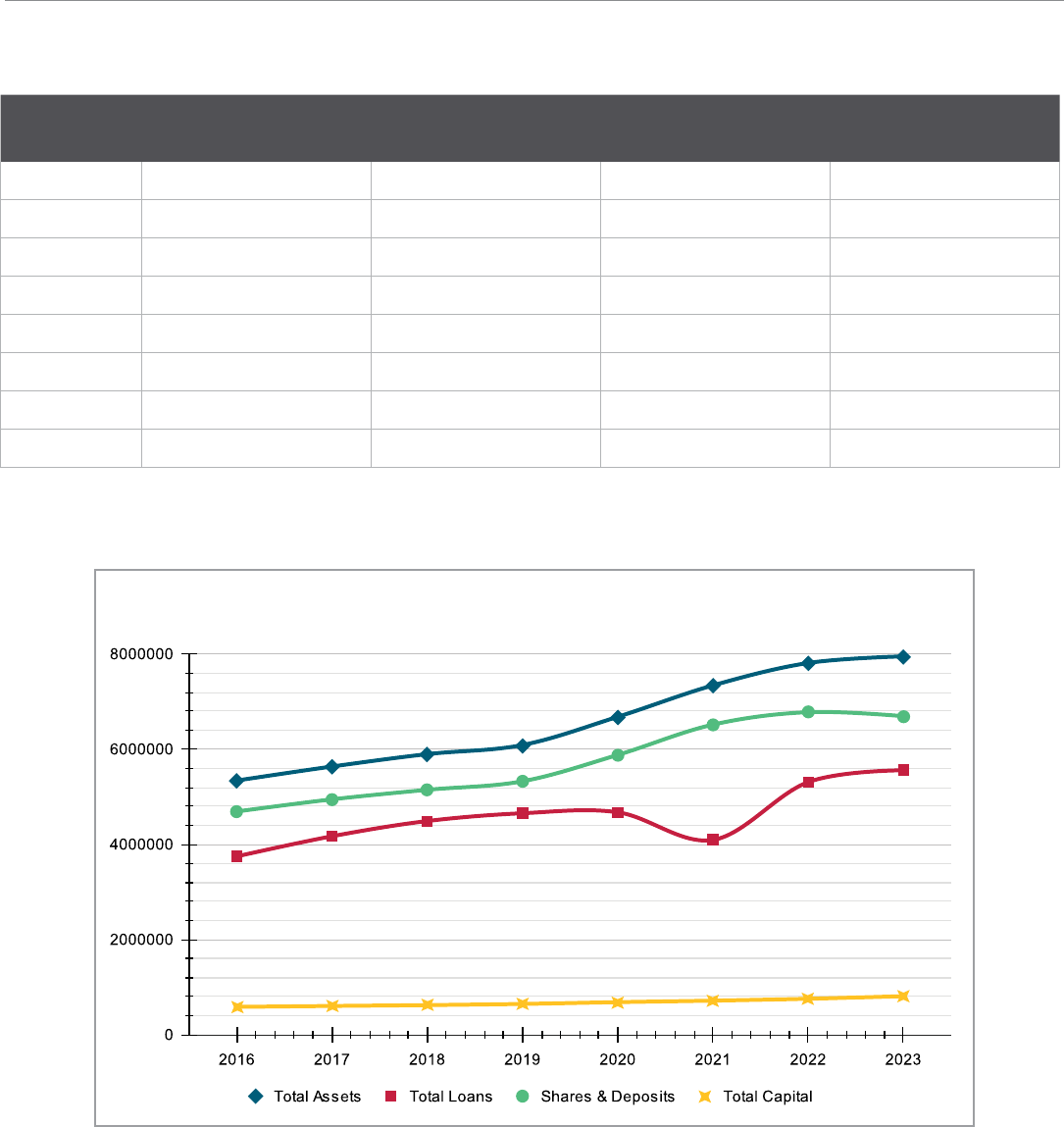
Page 59 of 84
Financial Regulation Annual Report 2023
FIGURE 12. State-Chartered Credit Union Growth Trends
FIGURE 11. Credit Union Prior Period End Totals
Fiscal Years Ended June 30th (in thousands)
YEAR TOTAL ASSETS TOTAL LOANS SHARES & DEPOSITS TOTAL CAPITAL
2023 $7,952,061 $5,558,440 $6,694,963 $811,808
2022 $7,812,560 $5,309,748 $6,779,447 $757,461
2021 $7,342,133 $4,094,893 $6,517,717 $718,118
2020 $6,682,139 $4,675,647 $5,881,260 $686,290
2019 $6,089,506 $4,655,584 $5,327,541 $649,009
2018 $5,897,917 $4,491,816 $5,148,133 $624,210
2017 $5,637,718 $4,172,460 $4,947,779 $606,295
2016 $5,343,323 $3,749,515 $4,692,960 $586,882
SOURCE: State-Chartered Credit Union Call Reports

Page 60 of 84
Financial Regulation Annual Report 2023
FIGURE 13. State-Chartered Credit Unions – Assets and Field of Membership Types
Fiscal Year Ended June 30, 2023
NAME
PRINCIPAL
LOCATION
TOTAL
ASSETS
(in thousands)
TOTAL
DEPOSITS
(in thousands)
LOW-
INCOME
DESIGNATION
NO. OF
BRANCHES
NO. OF LMI
BRANCHES
(as % of
total)*
FIELD OF
MEMBERSHIP
TYPE
Central Credit Union
of Maryland
Towson $46,473 $41,949 Yes 2 0 (0%)
Multiple
Common Bond
Destinations Credit
Union
Parkville $65,950 $58,976 Yes 2 0 (0%)
Multiple
Common Bond
HAR-CO Credit
Union
Bel Air $250,155 $226,070 No 3 1 (33%)
Community
Common Bond
Municipal Employees
Credit Union of
Baltimore (MECU)
Baltimore $1,300,908 $1,122,904 Yes 9 7 (78%)
Multiple
Common Bond
Point Breeze Credit
Union
Hunt Valley $929,078 $803,153 No 5 1 (20%)
Multiple
Common Bond
Post Office Credit
Union of MD, Inc.
Baltimore $31,252 $23,651 ** 1 1 (100%)
Single
Common Bond
State Employees
Credit Union of
Maryland, Inc. (SECU)
Linthicum $5,328,245 $4,418,260 Yes 25 4 (16%)
Multiple
Common Bond
TOTAL: 7 $7,952,061 $6,694,963 47 14 (30%)
* Branch LMI designations may vary year-to-year due to annual changes in census tract income levels
** Post Office Credit Union of MD, Inc. is privately insured by ASI. The NCUA low-income designation does not apply.
FIGURE 14. Selected Balance Sheet Items – State-Chartered Credit Unions
Fiscal Year Ended June 30, 2023 (in thousands)
CREDIT UNION NAME TOTAL ASSETS
TOTAL
LOANS
SHARES &
DEPOSITS
TOTAL
CAPITAL
ASI Private Share Insurance
Post Office Credit Union of MD, Inc. $31,252 $7, 201 $23,651 $7,488
National Credit Union Share Insurance
Central Credit Union of MD, Inc. $46,473 $19,173 $41,949 $4,549
Destinations Credit Union $65,950 $31,153 $58,976 $8,744
HAR-CO Credit Union $250,155 $168,991 $226,070 $21,394
Municipal Employees Credit Union of Baltimore, Inc. $1,300,908 $799,227 $1,122,904 $153,787
Point Breeze Credit Union $929,078 $574,101 $803,153 $124,565
State Employees Credit Union of MD, Inc. $5,328,245 $3,958,594 $4,418,260 $491,281
Total All Maryland State-Chartered Credit Unions $7,952,061 $5,558,440 $6,694,963 $811,808
SOURCE: State-Chartered Credit Union Call Reports
SOURCES: NCUA, FFIEC and State-Chartered Bank websites

Page 61 of 84
Financial Regulation Annual Report 2023
FIGURE 15. NCUA Insured Credit Unions - Trend Year-Over-Year
Fiscal Years Ended June 30th ($ in thousands)
Year
Number of
NCUA Insured
MD Chartered
Credit Unions
Total Assets of
NCUA Insured
MD Chartered
Credit Unions*
Number
of NCUA
Insured Credit
Unions**
Total Assets All
NCUA Insured
Credit Unions
% of MD
Chartered Credit
Unions to All
NCUA Insured
Credit Unions
% of MD Chartered
Credit Union Assets
to All NCUA Insured
Credit Union Assets
2023 6 $7,920, 809 4,686 $2,220,000,000 0.130% 0.357%
2022 6 $7,778, 355 4,853 $2,140,000,000 0.120% 0.363%
2021 6 $7,308,307 5,029 $1,980,000,000 0.120% 0.369%
2020 6 $6,649,694 5,164 $1,750,000,000 0.120% 0.380%
2019 6 $6,058,053 5,308 $1,520,000,000 0.110% 0.399%
SOURCE: NCUA
FIGURE 16. Federal Credit Unions – Operating Branches in Maryland
Fiscal Year Ended June 30, 2023
NAME PRINCIPAL LOCATION
LOW-INCOME
DESIGNATION
OFFICES
Agriculture Federal Credit Union (AgFed) Washington, DC Yes 2
Baxter Credit Union (BCU), FCU Vernon Hills, IL No 1
Democracy Federal Credit Union Alexandria, VA Yes 1
Department of Commerce Federal Credit Union Washington, DC Yes 1
InFirst Federal Credit Union Alexandria, VA Yes 1
John Wesley AME Zion Church Federal Credit Union Washington, DC Yes 1
Navy Federal Credit Union Vienna, VA No 22
Northrop Grumman Federal Credit Union Gardena, CA No 3
Northwest Federal Credit Union Herndon, VA Yes 1
Partners 1st Federal Credit Union Fort Wayne, IN Yes 2
Patriot Federal Credit Union Chambersburg, PA Yes 3
Pentagon Federal Credit Union McLean, VA No 1
Spectra Federal Credit Union Alexandria, VA Yes 1
Treasury Department Federal Credit Union Washington, DC Yes 1
TOTAL: 14 41
SOURCE: NCUA
* MD chartered Post Office Credit Union of Maryland is privately insured
** All U.S. NCUA insured credit unions

Page 62 of 84
Financial Regulation Annual Report 2023
FIGURE 17. Federal Credit Unions – Headquartered in Maryland
Fiscal Year Ended June 30, 2023
NAME
PRINCIPAL
LOCATION
TOTAL ASSETS
(in thousands)
TOTAL DEPOSITS
(in thousands)
LOW-INCOME
DESIGNATION
OFFICES
in MD
Aberdeen Proving Ground (APG) FCU Edgewood $2,160,702 $1,945,586 No 13
ACT 1st Federal Credit Union Lavale $144,739 $133,064 Yes 3
Andrews Federal Credit Union Suitland $2,424,418 $1,920,981 Yes 3
APL Federal Credit Union Laurel $631,686 $556,755 No 3
Atlantic Financial Federal Credit Union Hunt Valley $105,342 $96,006 No 2
Baltimore County Employees FCU Towson $498,107 $472,538 No 3
Baltimore Washington Federal Credit Union Glen Burnie $10,229 $9,424 Yes 1
BEE Federal Credit Union Salisbury $8,180 $6,487 Yes 1
Bulldog Federal Credit Union Hagerstown $225,242 $219,068 Yes 8
Capital Area Realtors Federal Credit Union Rockville $21,297 $19,006 Yes 1
Capital Area Taiwanese Federal Credit Union Boyds $13,820 $11,712 No 1
Cecil County School Employees FCU Elkton $28,432 $25,733 No 1
Cedar Point Federal Credit Union Lexington Park $749,728 $691,035 No 6
Census Federal Credit Union Suitland $52,278 $45,812 No 1
Chessie Federal Credit Union Cumberland $435,408 $390,125 Yes 8
Choptank Electric Co-Op Employees FCU Denton $2,915 $2,156 No 1
Delmarva Power Southern Division FCU Salisbury $18,254 $14,605 Yes 1
Educational Systems Federal Credit Union Greenbelt $1,306,486 $1,122,344 No 14
FedChoice Federal Credit Union Lanham $431,167 $395,252 Yes 2
FedFinancial Federal Credit Union Silver Spring $85,103 $78,207 No 2
FERKO Maryland Federal Credit Union Frederick $35,816 $31,419 No 1
First Eagle Federal Credit Union Owings Mills $110,920 $99,365 Yes 2
First Financial Of Maryland FCU Sparks $1,266,890 $997,005 No 8
First Peoples Community FCU Cumberland $569,778 $499,934 Yes 11
Five Star Federal Credit Union Baltimore $59,445 $52,217 Yes 3
Freedom Federal Credit Union Bel Air $437,550 $387,889 No 6
Greenbelt Federal Credit Union Greenbelt $37,607 $33,760 Yes 1
HEMA Federal Credit Union Silver Spring $18,502 $16,820 Yes 1
Howard County Education FCU Ellicott City $25,760 $23,332 No 1
IBEW 26 Federal Credit Union Lanham $31,177 $28,891 No 1
Johns Hopkins Federal Credit Union Baltimore $621,793 $521,106 Yes 4
Korean Catholic Federal Credit Union Olney $2,237 $1,989 No 1
Continued on next page.

Page 63 of 84
Financial Regulation Annual Report 2023
FIGURE 17. Federal Credit Unions – Headquartered in Maryland
Fiscal Year Ended June 30, 2023
NAME
PRINCIPAL
LOCATION
TOTAL ASSETS
(in thousands)
TOTAL DEPOSITS
(in thousands)
LOW-INCOME
DESIGNATION
OFFICES
in MD
Lafayette Federal Credit Union Rockville $1,880,258 $1,564,475 Yes 4
LM Federal Credit Union Baltimore $55,729 $50,757 No 1
Local 355 MD Federal Credit Union Baltimore $6,105 $4,974 No 2
Market USA Federal Credit Union Laurel $140,182 $111,605 Yes 3
Masters, Mates & Pilots (MM&P) FCU Linthicum $3,224 $2,964 No 1
Members First of Maryland FCU Baltimore $26,085 $24,195 Yes 2
Mid-Atlantic Federal Credit Union Germantown $409,746 $370,902 Yes 4
Maryland-National Capital Park and Planning
Commission (MNCPPC) Federal Credit Union
College Park $15,131 $13,105 No 2
Money One Federal Credit Union Largo $119,805 $93,219 Yes 1
Mount Jezreel Federal Credit Union Silver Spring $297 $268 Yes 1
MVP Postal And Printing FCU Gaithersburg $4,078 $3,684 Yes 1
NASA Federal Credit Union Upper Marlboro $5,133,032 $4,088,843 No 7
National Institutes of Health (NIH) FCU Rockville $822,498 $760,792 No 5
None Suffer Lack Federal Credit Union Suitland $24,989 $20,183 Yes 1
Nymeo Federal Credit Union Frederick $356,071 $316,891 Yes 4
Peninsula General Hospital & Medical
Center Employees Federal Credit Union
Salisbury $45,343 $3,464 No 1
Police Federal Credit Union Upper Marlboro $173,593 $150,391 No 1
Prince George’s Community FCU Bowie $253,387 $220,051 Yes 3
Securityplus Federal Credit Union Baltimore $557,210 $487,897 Yes 7
Self Reliance Baltimore Federal Credit Union Baltimore $15,911 $14,035 No 1
Signal Financial Federal Credit Union Kensington $420,879 $373,513 Yes 3
SkyPoint Federal Credit Union Germantown $211,496 $176,616 Yes 3
St. Joseph Medical Center FCU Towson $15,700 $13,214 No 1
Thiokol-Elkton Federal Credit Union Elkton $25,001 $21,956 No 1
Tower Federal Credit Union Laurel $4,492,750 $3,750,815 No 17
Transit Employees Federal Credit Union Greenbelt $98,579 $83,603 Yes 1
U.S. Postal Service Federal Credit Union Clinton $264,721 $233,232 Yes 1
WSSC Federal Credit Union Laurel $34,647 $31,920 Yes 2
Washington County Teachers FCU Hagerstown $85,141 $73,461 No 3
WEPCO Federal Credit Union Bloomington $348,395 $297,750 Yes 6
TOTAL: 62 $28,610,991 $24,208,398 205
SOURCE: NCUA
FIGURE 17. Federal Credit Unions – Headquartered in Maryland (c ont.)
Fiscal Year Ended June 30, 2023

Page 64 of 84
Financial Regulation Annual Report 2023
FIGURE 18. State-Chartered Non-Depository Trust Companies – Location and Business Type
Fiscal Year Ending June 30, 2023
FIGURE 19. Trust Assets Reported by State-Chartered Trust Companies
Fiscal Year Ended June 30, 2023 (in thousands)
Full Service Trust Companies Managed Non-Managed Custodial Total
First United Bank & Trust $1,022,002 $60,076 $5,309 $1,087,387
Sandy Spring Bank $1,734,555 $155,644 $35,954 $1,926,153
Total Assets - Full Service Trust Companies $2,756,557 $215,720 $41,263 $3,013,540
Non-Depository Trust Companies Managed Non-Managed Custodial Total
Brown Investment Advisory & Trust Co. $7,371,597 $952,855 - $8,324,452
Chevy Chase Trust Company $13,765,090 $22,237,075 $3,864,056 $39,866,221
NewTower Trust Company $11,883,188 $0 $0 $11,883,188
T. Rowe Price Trust Company $294,562,629 $241,590,786 - $536,153,415
Total Assets - Non-Depository Trust Companies $327,582,504 $264,780,716 $3,864,056 $596,227,276
GRAND TOTAL:
Full Service and Non-Depository Trust
Companies
$330,339,061 $264,996,436 $3,905,319 $599,240,816
TRUST COMPANY NAME PRINCIPAL LOCATION TRUST/FIDUCIARY BUSINESS PURPOSE
Brown Investment Advisory and Trust Co. Baltimore Investment Advisory Services
Chevy Chase Trust Bethesda Investment Management/Financial Planning
NewTower Trust Company Bethesda Trustee for Multi-Employer Property Trust
T. Rowe Price Trust Company Baltimore Investment Management
TOTAL: 4
SOURCE: Trust Company Prepared Call Reports
SOURCE: OFR
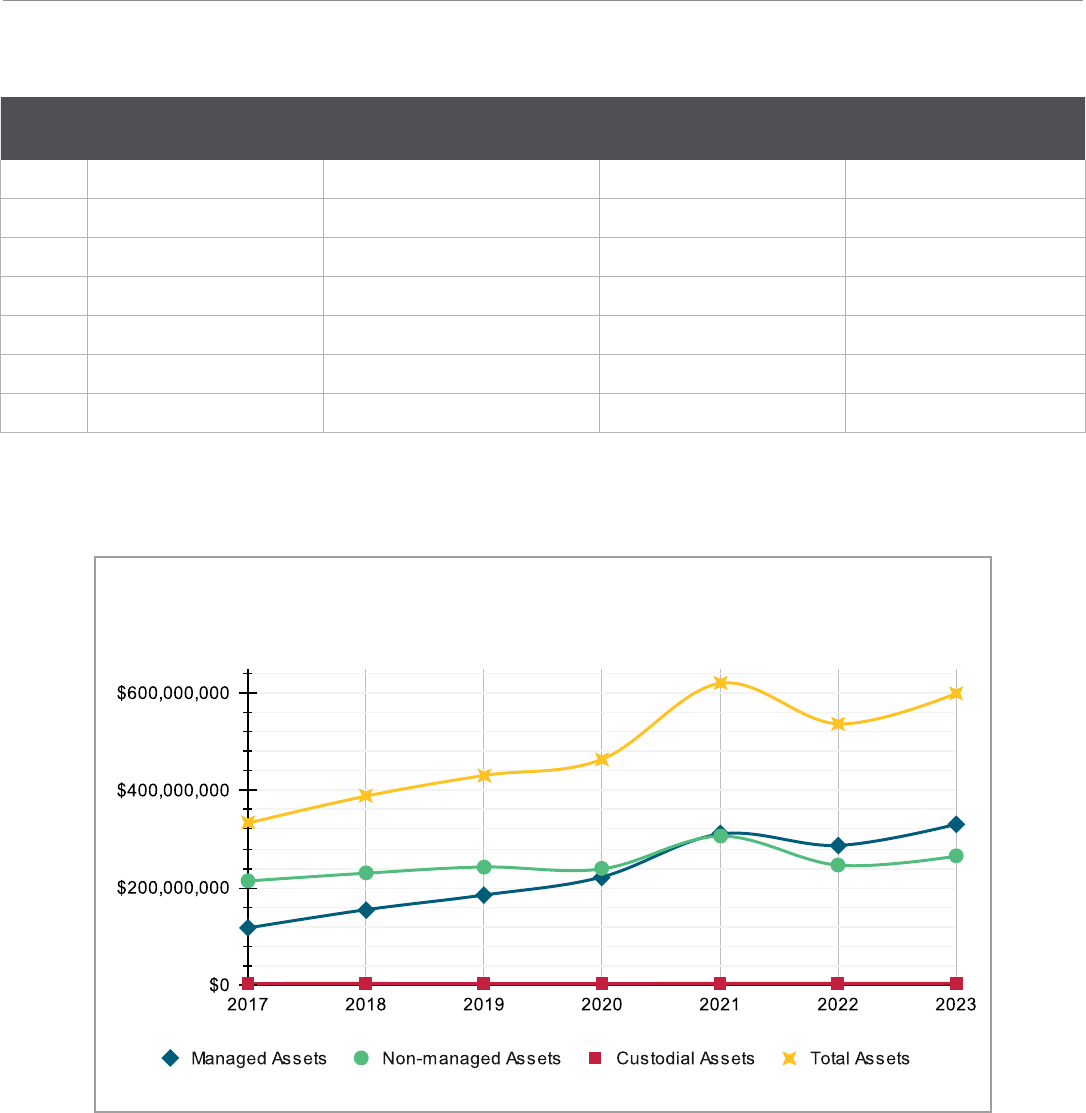
Page 65 of 84
Financial Regulation Annual Report 2023
FIGURE 21. Maryland Trust Companies Asset Growth Trends
FIGURE 20. State-Chartered Trust Companies Asset Growth Trends
Fiscal Years Ended June 30th (in thousands)
YEAR Managed Assets Non-managed Assets Custodial Assets Total Assets
2023 $330,339,061 $264,996,436 $3,905,319 $599,240,816
2022 $286,927,341 $246,401,053 $3,400,567 $536,728,961
2021 $310,400,970 $305,973,519 $3,647,858 $620,022,347
2020 $222,254,936 $238,704,184 $3,072,175 $464,031,295
2019 $185,084,556 $242,752,297 $2,888,167 $430,725,020
2018 $154,979,630 $229,915,987 $3,434,187 $388,329,804
2017 $117,541,968 $213,962,146 $3,269,886 $332,774,000
SOURCE: Trust Company Prepared Call Reports

Page 66 of 84
Financial Regulation Annual Report 2023
FIGURE 22. BANKS, CREDIT UNIONS, AND TRUST COMPANIES
Activity on Select Applications Fiscal Year Ending June 30, 2023
MERGERS and ACQUISITIONS
Surviving Institution
Main Location
Merged/Acquired Institution
Main Location
Approval
Summit Community Bank
Moorefield, WV
Provident State Bank
Preston, MD
02/24/2023
Summit Financial Group, Inc.
Moorefield, WV
PSB Holding Corp.
Preston, MD
02/24/2023
Shore United Bank N.A.
Easton, MD
The Community Bank of the Chesapeake
Waldorf, MD
03/07/2023
Shore Bancshores, Inc.
Easton, MD
The Community Financial Corporation
Waldorf, MD
03/07/2023
LINKBANCORP, Inc.
Camp Hill, PA
Partners Bancorp
Salisbury, MD
06/16/2023
MARYLAND CHARTER CONVERSION (TO A STATE-CHARTERED COMMERCIAL BANK)
Institution Name
Main Location
Action Approval
BayVanguard Bank
Baltimore, MD
Converted from a Maryland state-chartered
savings bank to a Maryland state-chartered
commercial bank.
07/21/2023
BV Financial, Inc.
Baltimore, MD
Merger of Bay-Vanguard, M.H.C., Inc. into BV
Financial, Inc. effectuated the conversion of
BayVanguard Bank’s bank holding company
from a mutual holding company to a stock
form holding company.
Pending
AFFILIATE FORMATION
Institution Name
Main Location
Afliate Approval
First United Bank & Trust
Oakland, MD
Investment Adviser Firm 01/12/2023
SOURCE: OFR Prepared Snapshot of Select Corporate Activities Applications

Page 67 of 84
Financial Regulation Annual Report 2023
FS 1. Summary of All Office Revenues and Expenditures Page 68
FS 2. Revenues and Expenditures – General Fund Page 69
FS 3. Revenues and Expenditures – Bank, Credit Union and Non-Depository Trust Company Special Fund Page 70
FS 4. Revenues and Expenditures – Non-Depository Special Fund Page 71
FS 5. Revenues and Expenditures – Foreclosed Property Registry Special Fund Page 72
FS 6. Revenues and Expenditures – Mortgage Foreclosure Mediation Special Fund Page 73
Financial Statements
APPENDIX B:

Page 68 of 84
Financial Regulation Annual Report 2023
FS 1. Summary of All Office Revenues and Expenditures
Fiscal Years Ended June 30th
* OFR has not been charged for parking since its move to the Maryland Dept. of Labor building on
Eutaw Street in February 2022.
REVENUES FY 2023 FY 2022 FY 2021
Special Funds
Banking and Credit Union $4,991,401 $5,049,103 $4,683,968
Non-Depository $10,016,573 $12,151,743 $10,943,547
Subtotal $15,007,974 $17,200,846 $15,627,515
Foreclosure-Related Special Funds
Mortgage Foreclosure Mediation $0 $0 $8,205
Foreclosed Property Registry $155,592 $74,818 $80,923
Subtotal $155,592 $74,818 $89,128
General Funds
Licensing Fees $0 $0 $0
Fines & Penalties $183,876 $185,293 $152,946
Miscellaneous $500 -$2,660 $150
Subtotal $184,376 $182,633 $153,096
Total Revenue $15,347,942 $17,458,297 $15,869,739
EXPENDITURES FY 2023 FY 2022 FY 2021
Salaries and Benefits $10,060,069 $9,072,836 $8,259,770
Technical and Special Fees $914,180 $802,366 $775,987
Communication $100,512 $83,184 $48,853
Travel/Training $121,052 $41,574 $17,331
Lease Expense, Parking Facilities* $0 $53,700 $73,536
Contractual Services $569,371 $370,159 $281,184
Supplies and Materials $23,937 $27, 238 $26,710
Equipment $85,285 $27,206 $47,336
Fixed Charges, Rent $222,804 $287,642 $367,060
Administrative Expenses $1,701,021 $1,576,861 $1,432,305
Prior year accruals/encumbrance liquidations $35,565 $10,827 $0
Total Expenditures $13,833,795 $12,353,594 $11,330,071
Net Revenue for Fiscal Year $1,514,146 $5,104,703 $4,539,668
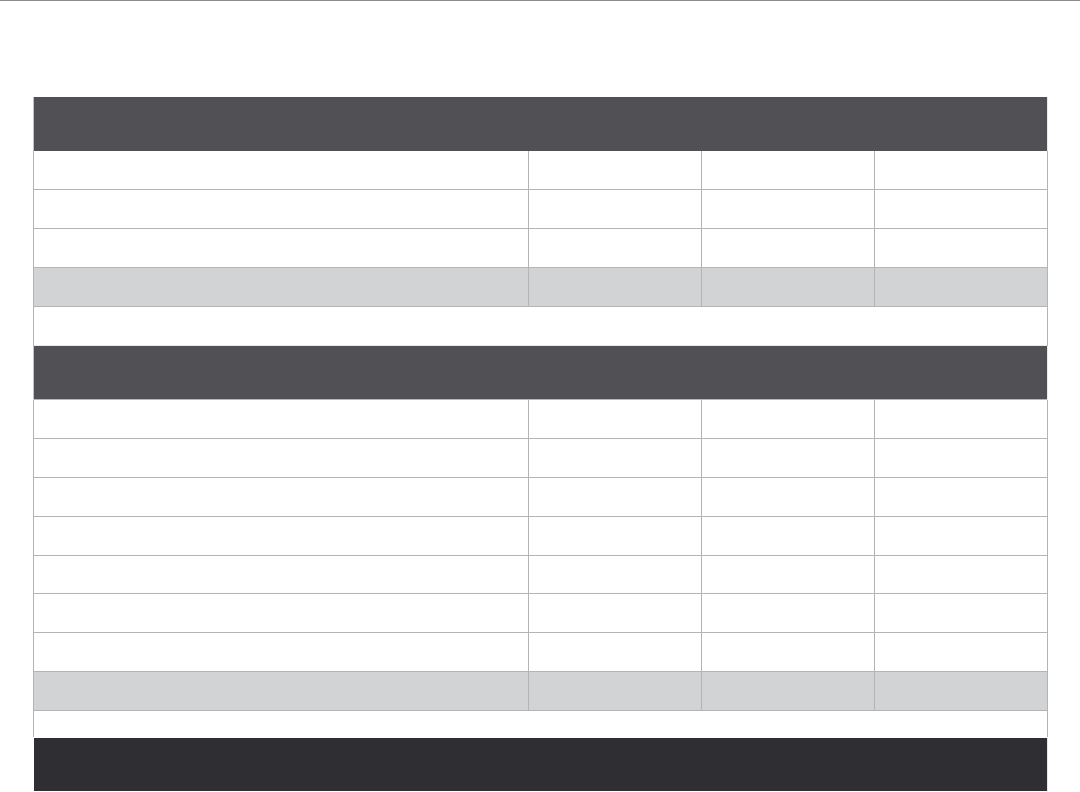
Page 69 of 84
Financial Regulation Annual Report 2023
FS 2. Revenues and Expenditures – General Fund
Fiscal Years Ended June 30th
REVENUE FY 2023 FY 2022 FY 2021
Non-Depository Licensing Fees $0 $0 $0
Fines & Penalties * $183,876 $185,293 $152,946
Miscellaneous $500 -$2,660 $150
Total Revenue $184,376 $182,633 $153,096
* All Fines & Penalties from all Programs are paid into the State’s General Fund.
EXPENDITURES FY 2023 FY 2022 FY 2021
Salaries and Benefits $0 $0 $0
Technical and Special Fees $6,251 $28,361 $130,946
Communication $0 $0 $1
Travel/Training $0 $0 $0
Contractual Services $0 $0 $0
Supplies and Materials $0 $0 $0
Equipment $0 $0 $2,748
Total Expenditures $6,251 $28,361 $133,695
Net Revenue for Fiscal Year $178,125 $154,272 $19,402

Page 70 of 84
Financial Regulation Annual Report 2023
FS 3. Revenues and Expenditures – Bank, Credit Union and Non-Depository Trust Company Special Fund
Fiscal Years Ended June 30th
* OFR has not been charged for parking since its move to the Maryland Dept. of Labor building on
Eutaw Street in February 2022.
REVENUE FY 2023 FY 2022 FY 2021
Bank and Credit Union Assessments $4,768,597 $4,832,226 $4,465,959
Non-Depository Trust Company Assessments $205,062 $208,537 $200,489
Depository Amendment and Filing Fees $17,742 $8,340 $17,520
Miscellaneous Income/Other $0 $0 $0
Total Revenue $4,991,401 $5,049,103 $4,683,968
EXPENDITURES FY 2023 FY 2022 FY 2021
Salaries and Benefits $2,669,083 $2,662,958 $2,257,087
Technical and Special Fees $447,080 $422,269 $371,009
Communication $18,845 $22,385 $11,313
Travel/Training $13,517 $14,780 $10,054
Lease Expense, Parking Facilities* $0 $5,975 $7,8 84
Contractual Services $5,819 $4,490 $5,053
Supplies and Materials $11,691 $14,645 $12,083
Equipment $0 $630 $64,904
Fixed Charges, Rent $60,908 $141,133 $135,764
Administrative Expenses $459,661 $448,103 $359,844
Prior year accruals/encumbrance liquidations $0 -$1,979 $0
Total Expenditures $3,686,605 $3,735,390 $3,234,995
Net Revenue for Fiscal Year $1,304,796 $1,313,713 $1,448,973
Special Fund Balance Carried Forward $11,193,914 $9,889,117 $8,575,405

Page 71 of 84
Financial Regulation Annual Report 2023
FS 4. Revenues and Expenditures – Non-Depository Special Fund
Fiscal Years Ended June 30th
* OFR has not been charged for parking since its move to the Maryland Dept. of Labor building on
Eutaw Street in February 2022.
REVENUE FY 2023 FY 2022 FY 2021
Non-Depository License Fees $9,498,184 $11,804,183 $10,393,066
Non-Depository Examination Fees $518,389 $303,742 $286,657
Miscellaneous Income/Other $0 $43,818 $263,824
Total Revenue $10,016,573 $12,151,743 $10,943,547
EXPENDITURES FY 2023 FY 2022 FY 2021
Salaries and Benefits $7,272,075 $6,355,425 $5,919,097
Technical and Special Fees $460,812 $349,035 $325,357
Communication $45,054 $50,056 $25,472
Travel/Training $107,125 $28,057 $2,551
Lease Expense, Parking Facilities* $0 $51,830 $65,238
Contractual Services $489,284 $262,688 $21,012
Supplies and Materials $12,226 $15,547 $12,065
Equipment $85,285 $26,844 $45,616
Fixed Charges, Rent $161,896 $226,734 $225,927
Administrative Expenses $1,083,409 $1,011,388 $879,606
Prior year accruals/encumbrance liquidations $35,565 -$4,406 $0
Total Expenditures $9,752,732 $8,373,498 $7,521,940
Net Revenue for Fiscal Year $263,841 $3,778,245 $3,421,607
Special Fund Balance Carried Forward $18,944,795 $18,680,954 $14,902,709
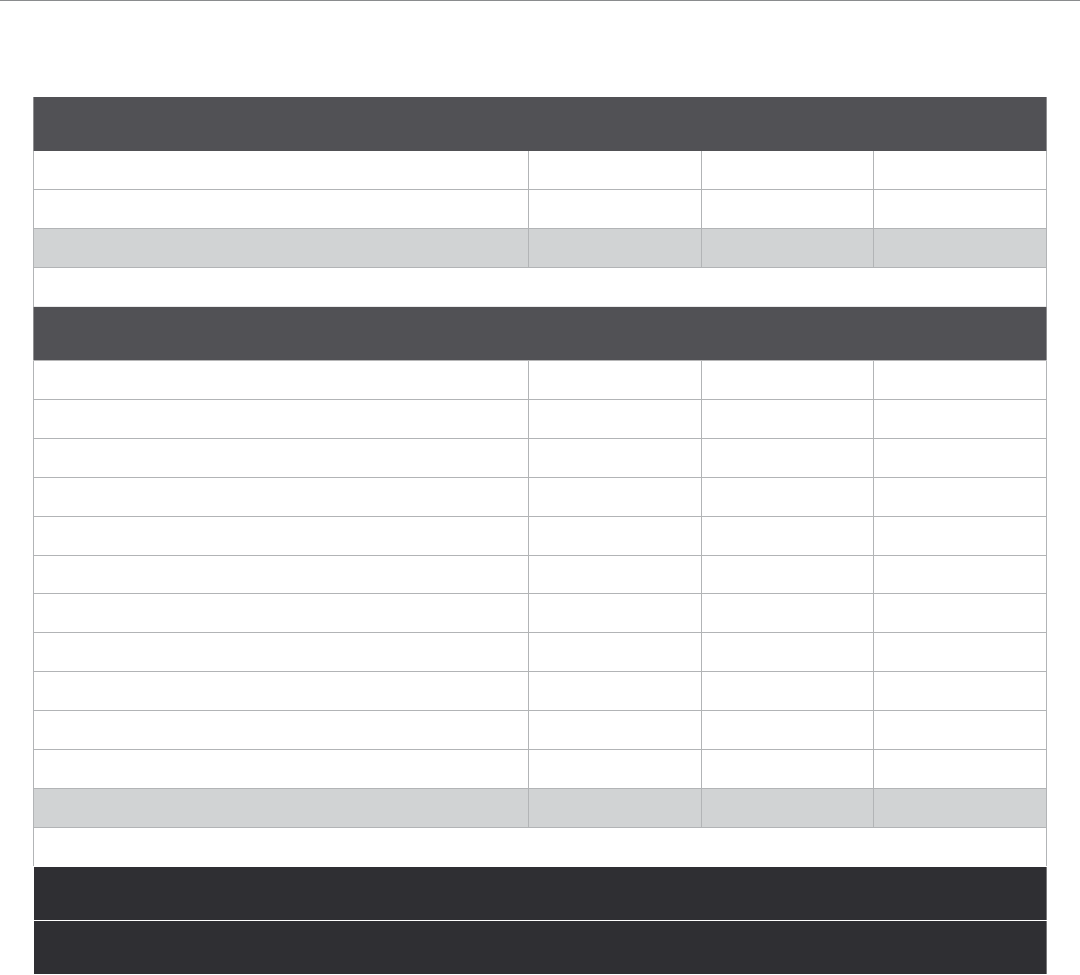
Page 72 of 84
Financial Regulation Annual Report 2023
FS 5. Revenues and Expenditures – Foreclosed Property Registry Special Fund
Fiscal Years Ended June 30th
NOTE: The Foreclosed Property Registry Special Fund (FS 5) includes unreimbursed expenses from Maryland DHCD
for foreclosure outreach mailings, which would have been shown in the Mortgage Foreclosure Mediation
Special Fund (FS 6) for FY22 and FY23.
REVENUE FY 2023 FY 2022 FY 2021
Foreclosure Registrations $126,550 $69,950 $76,250
Miscellaneous Income/Other $29,042 $4,868 $4,673
Total Revenue $155,592 $74,818 $80,923
EXPENDITURES FY 2023 FY 2022 FY 2021
Salaries and Benefits $118,910 $48,328 $83,586
Special and Technical $37 $0 $0
Communication $36,613 $14,283 $994
Travel/Training $409 $0 $0
Lease Expense, Parking Facilities* $0 $1,870 $2,323
Contractual Services $74,268 $101,652 $255,681
Supplies and Materials $20 $0 $0
Equipment $0 $362 $1,090
Fixed Charges, Rent $0 $0 $0
Administrative Expenses $157,951 $105,513 $104,596
Prior year accruals/encumbrance $0 $17, 212 0
Total Expenditures $388,208 $289,220 $448,271
Net Revenue for Fiscal Year -$232,616 -$214,402 -$367,348
Special Fund Balance Carried Forward $787,226 $1,019,842 $1,234,243
* OFR has not been charged for parking since its move to the Maryland Dept. of Labor building on
Eutaw Street in February 2022.
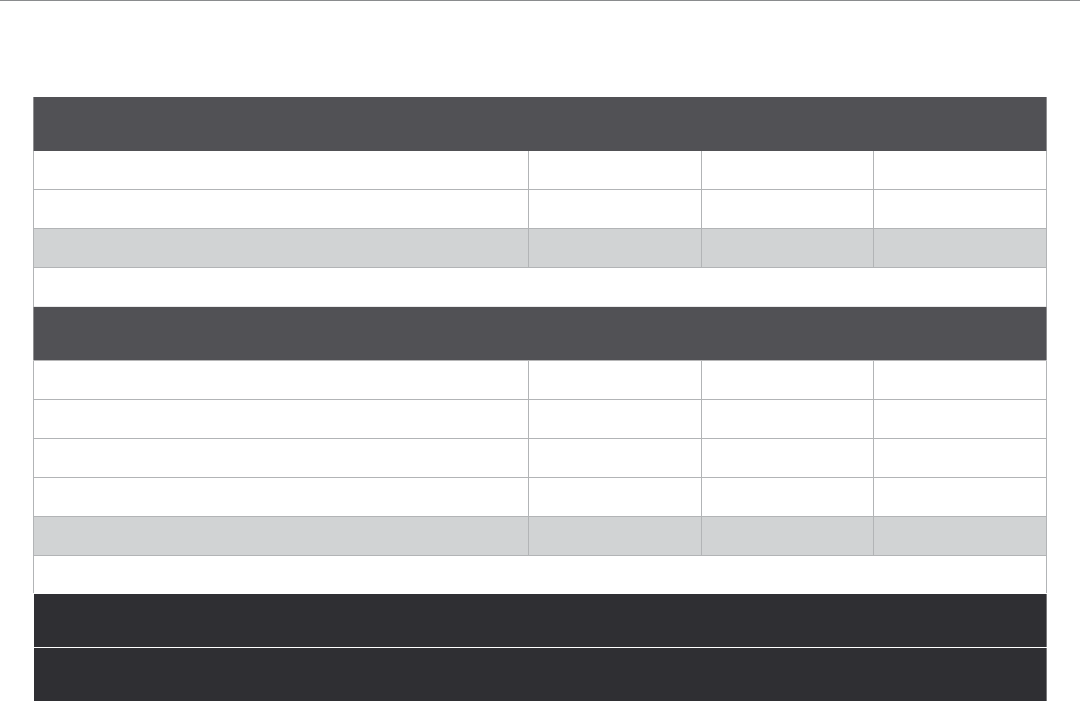
Page 73 of 84
Financial Regulation Annual Report 2023
FS 6. Revenues and Expenditures – Mortgage Foreclosure Mediation Special Fund
Fiscal Years Ended June 30th
NOTE: Reimbursement from Maryland DHCD for foreclosure outreach mailings was temporarily suspended
due to decreased foreclosure activity, as DHCD was not collecting ling fees during the foreclosure
moratorium. OFR continued sending outreach letters to homeowners, notwithstanding the interruption
in reimbursement. During FY22 and FY23 expenses related to foreclosure outreach mailings were being
charged to the Foreclosed Property Registry Special Fund (FS 5). OFR expects reimbursements to resume
in FY24, at which time expenses will be reported in the Mediation Special Fund.
REVENUE FY 2023 FY 2022 FY 2021
Miscellaneous Income/Other (Reimbursed) $0 $0 $8,205
Accrued revenue $0 $0 $0
Total Revenue $0 $0 $8,205
EXPENDITURES FY 2023 FY 2022 FY 2021
Communication $0 $0 $0
Contractual Services $0 $0 $0
Supplies and Materials $0 $0 $0
Administrative Expenses $0 $0 $0
Total Expenditures $0 $0 $0
Net Revenue for Fiscal Year $0 $0 $8,205
Special Fund Balance Carried Forward $0 $0 $0
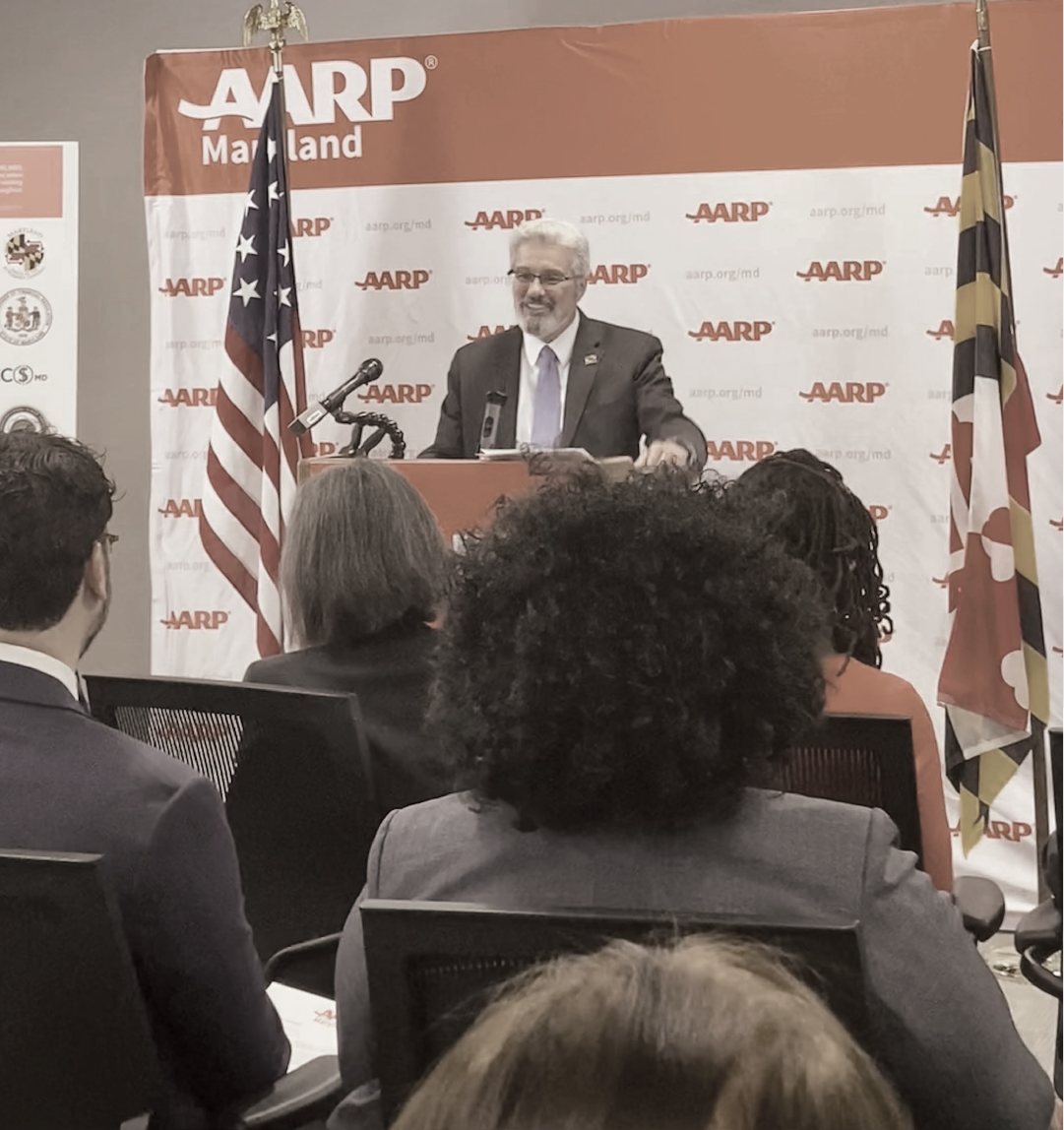
Financial Regulation Annual Report 2023 Page 74 of 84

Page 75 of 84
Financial Regulation Annual Report 2023
Commissioners as of June 30, 2023 Page 76
Deputy Commissioners as of June 30, 2023 Page 77
Historical Lists of Commissioners and Deputy Commissioners
APPENDIX C:

Page 76 of 84
Financial Regulation Annual Report 2023
Commissioners as of June 30, 2023
NAME FROM TO
Antonio P. Salazar 2017 Present
Gordon M. Cooley 2014 2017
Mark A. Kaufman 2010 2014
Sarah Bloom Raskin 2007 2010
Charles W. Turnbaugh 2003 2007
Mary Louise Preis 1999 2003
H. Robert Hergenroeder * 1996 1999
Margie H. Muller 1983 1996
Joseph R. Crouse 1980 1983
W. H. Holden Gibbs 1978 1980
William L. Wilson 1971 1978
William A. Graham 1967 1971
Herbert R. O'Conor, Jr. 1963 1967
W. R. Milford 1960 1963
William F. Hilgenberg 1959 1960
William H. Kirkwood, Jr. 1951 1959
Joseph P. Healy 1950 1951
J. Millard Tawes 1947 1950
John W. Downing 1939 1947
Warren F. Sterling 1935 1939
John J. Ghingher 1933 1935
George W. Page 1919 1933
J. Dukes Downs 1910 1919
* In 1996, the Bank Commissioner’s Office was merged by statute with the Office
of Consumer Credit, resulting in the change of titles from Bank Commissioner and
Deputy Bank Commissioner of Financial Regulation to Commissioner and Deputy
Commissioner of Financial Regulation respectively.

Page 77 of 84
Financial Regulation Annual Report 2023
Deputy Commissioners as of June 30, 2023
NAME FROM TO
Vacant 2023 Present
Gregory K. Thoreson 2021 2023
Teresa M. Louro 2016 2021
Keisha L. Whitehall Wolfe (Acting) 2014 2015
Gordon M. Cooley 2013 2014
Anne Balcer Norton 2010 2013
Mark A. Kaufman 2008 2010
Joseph E. Rooney 2003 2008
Nerry L. Mitchell 1999 2003
William L. Foster * 1996 1999
David M. Porter 1993 1996
Henry L. Bryson 1987 1993
Charles R. Georgius 1979 1987
Charles A. Knott, Jr. 1977 1979
Albert E. Clark 1972 1977
H. Sadtler Nolen 1967 1972
John D. Hospelhorn 1923 1967
John J. Ghingher 1919 1923
George W. Page 1912 1919
John C. Motter 1910 1912
* In 1996, the Bank Commissioner’s Office was merged by statute with the Office
of Consumer Credit, resulting in the change of titles from Bank Commissioner and
Deputy Bank Commissioner of Financial Regulation to Commissioner and Deputy
Commissioner of Financial Regulation respectively.

